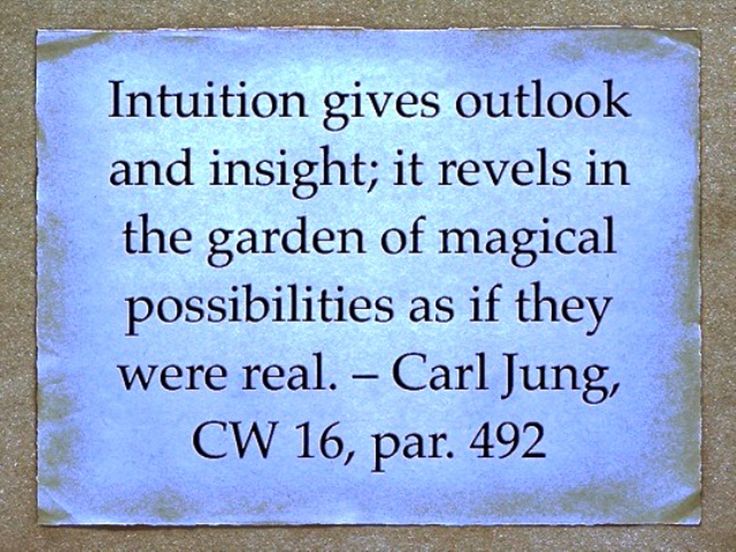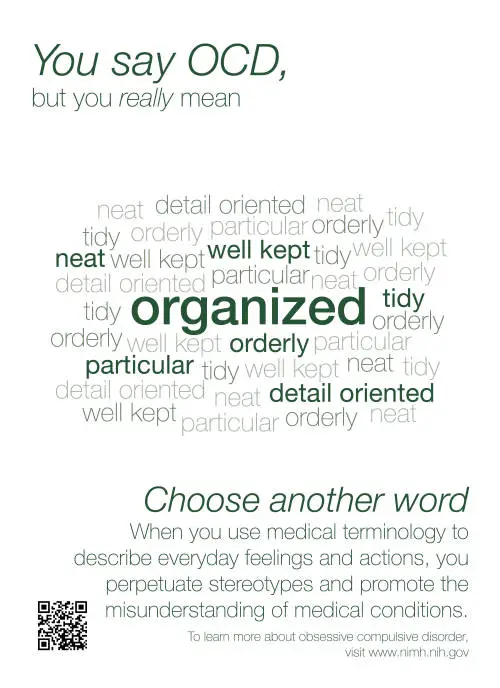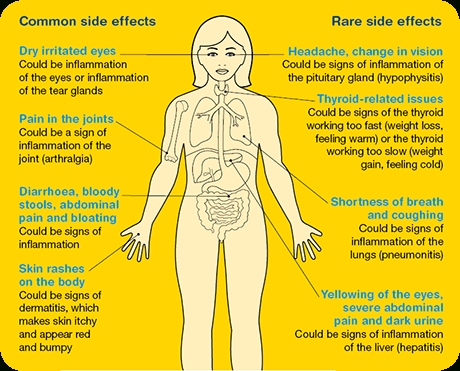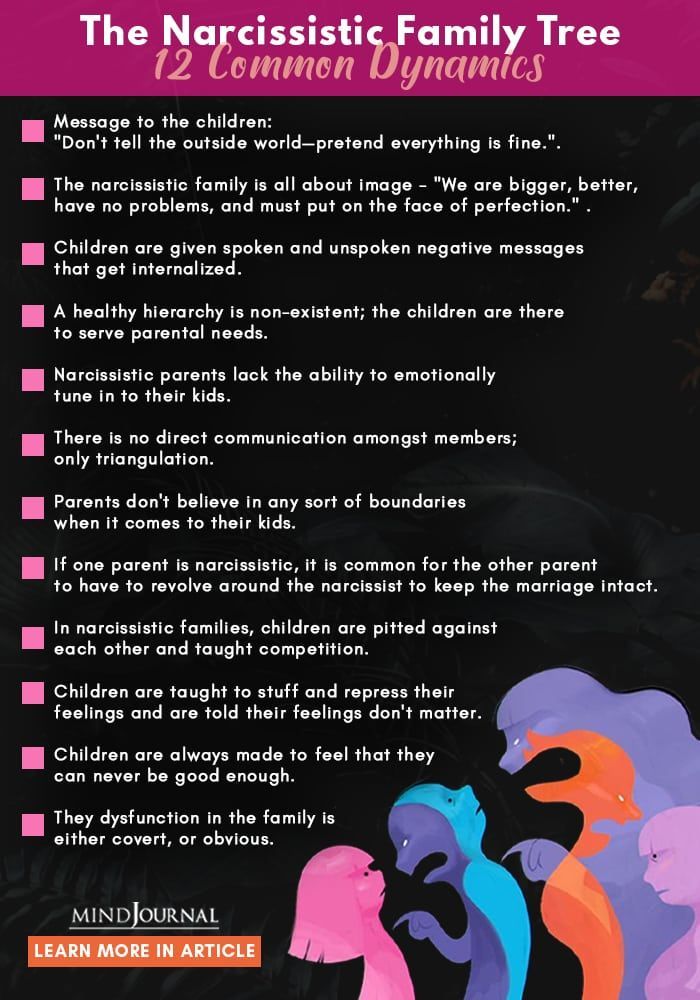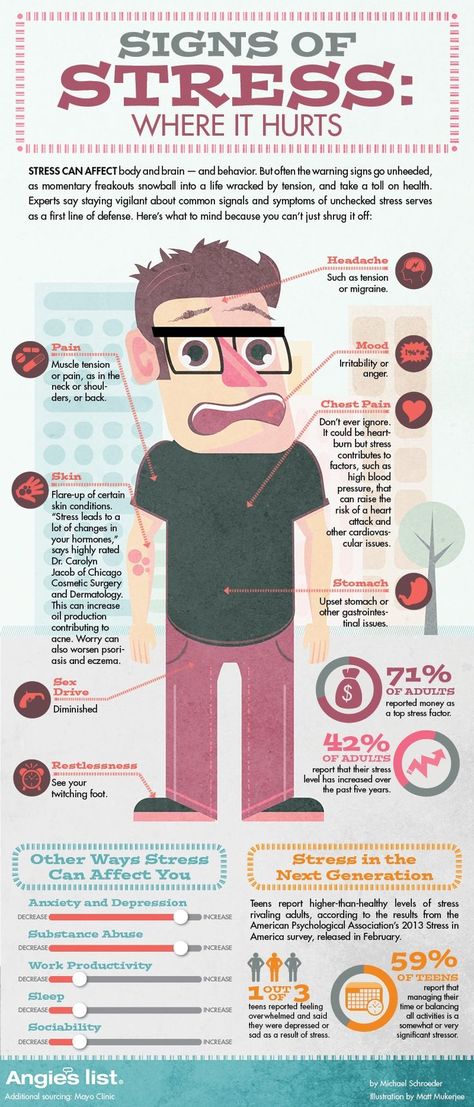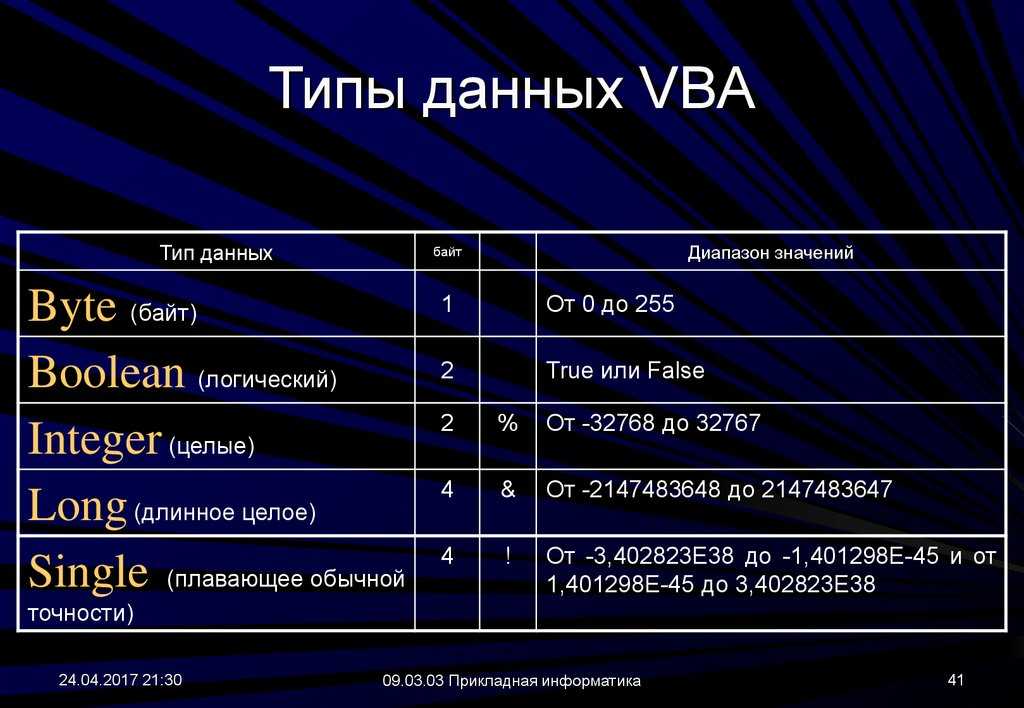Introverted intuition jung
The Magic and Mystery of Introverted Intuition
Have you ever wondered how Introverted Intuition works?
I have to admit, as an INFJ I sometimes find myself at odds with this mysterious function. If you look online, you’ll describe it as so many things:
Foresight
Pattern-recognition
“Psychic powers”
Regardless of how it’s described, Introverted Intuition (or “Ni” as type geeks like me call it) can be both a blessing and a curse to live with. Often I’d love to sink into its depths and soak in all the pictures and patterns it gives me; other times my predictions are scary and unsettling. When I have foreboding premonitions I feel like I must do anything to change the scenery. I try to focus on the here and now, pushing out any negative ideas.
But most of the time I love introverted intuition; I fall in love with what could be, and what I’ve seen leading up to a moment in time that I’ve yet to encounter. Anyone with Ni as their dominant function is going to enjoy using it, but it can also get messy sometimes.
Not sure what your personality type is? Take our new personality questionnaire here. Or you can take the official MBTI® here.
Table of contents
- How Introverted Intuition Works
- What does this mean though? What is the unconscious or collective unconscious?
- How does Introverted Intuition Play Out in Daily Life?
- The Dark Side of Introverted Intuition
- The Magic of Introverted Intuition
- What do you think?
Estimated reading time: 9 minutes
How Introverted Intuition WorksIntroverted intuition is a perceiving function that sorts through conscious and unconscious data giving the user a “vision” or symbol that holds great meaning. Some typologists call Ni “perspective-shifting” and an ability to see things from many different angles to find their underlying meaning and essence.
Isabel Briggs-Myers said the greatest gifts of Ni are the “flashes of inspiration, the insight into relationships, the imagination, the originality, the access to resources of the unconscious, the ingenuity, and the visions of what could be.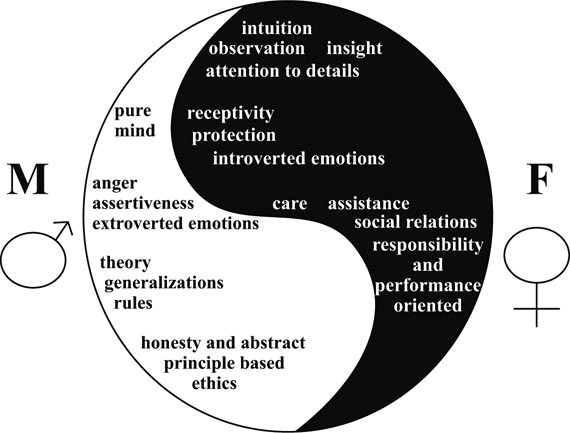 ”
”
Carl Jung said that Ni is “directed toward the inner object.”
But what is the inner object?
What Jung believed was that the inner object meant the areas of the unconscious. He believed that Ni-users didn’t just consider raw, outer material, but instead preferred to look at “subjective images of things which, though not to be met within the outside world, constitute the contents of the unconscious, and of the collective unconscious in particular.”
What does this mean though? What is the unconscious or collective unconscious?According to Jung, the psyche is made up of three separate but interacting systems. These three systems include the ego, the unconscious, and the collective unconscious.
The ego is the conscious mind. Thoughts, memories, and emotions that one is aware of are found in the ego. This is where we get our feelings of identity.
The second system of the psyche that Jung defined was the unconscious. The unconscious contains temporarily forgotten personal information, as well as abstract symbols and memories of which one may not even be aware. When we dream we often access the unconscious. In fact, many Ni-users report having especially vivid and influential dreams.
The unconscious contains temporarily forgotten personal information, as well as abstract symbols and memories of which one may not even be aware. When we dream we often access the unconscious. In fact, many Ni-users report having especially vivid and influential dreams.
The collective unconscious contains universal primordial images and ideas. Archetypes and symbols like the tree of life, the wise old man, or the great mother live here. Carl Jung believed that the collective unconscious had great influence over people and worked to add meaning and depth to life’s experiences. He found that these archetypal images were prevalent across various cultures and throughout various times in history, and so believed that they had some unconscious power in all civilizations.
INFJs are especially attached to the collective unconscious, and often interpret life through a series of symbols and images that can be traced back in time. When they explain themselves, they often use pictures to describe something rather than a literal account of events.
As an example from my own life, instead of pondering my feelings (“I feel sad, bored, trapped, angry, cheated”) I might simply imagine myself in a bird cage tossed and turned on a stormy sea as the key to my escape sinks to the bottom of the ocean. This picture fills my mind and that feels like my reality more than actual words.
As another example, when an INJ is wasting their time they might not think, “dang it, I’m wasting my time!” They might instead imagine our bodies aging and deteriorating, the earth spinning rapidly, or other symbols that mean something to them about the passage of time. As you can see, we tend to think in non-linear pictures and see events and situations as symbolic or pre-emptive signs of things to come.
There are a lot of articles out there that will define introverted intuition as an ability to plan, but many types can plan! What makes Ni unique is that it it is focused on seeing or envisioning symbols and images from the unconscious that mean something for the future.
Introverted intuition sees the background material of what happens in daily life and is more concerned with this background material or hidden meaning than it is with what shows up on the surface. Jung said “For intuition, therefore, unconscious images acquire the dignity of things.”
How does Introverted Intuition Play Out in Daily Life?People with introverted intuition often have gut feelings that are uncannily accurate. They are excellent at spotting trends or patterns to form a prediction of what may be. They often don’t know how they got these predictions or why, but one neuroscience expert named Dario Nardi has an idea of how it all works…
“The Ni types often show a whole-brain, zen-like pattern. This pattern occurs when all regions of the neocortex are in synch and dominated by brain waves that are medium-low frequency and very high-amplitude….What is this zen state like? When presented with a problem, the Ni types seek to harness all neocortex regions in order to “realize” an answer.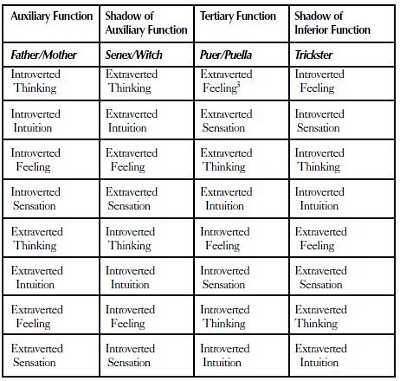 Imagine a troop of blind men trying to identify a secret object by touch. One man feels a trunk and says, “tree”; another detects four legs and says “table”; a third feels tusks and says “boar”. Like the blind men, each region offers a different perspective, and a zen-like synchronous state allows the person to reconcile various perspectives to arrive at a best-fit answer (an elephant).”
Imagine a troop of blind men trying to identify a secret object by touch. One man feels a trunk and says, “tree”; another detects four legs and says “table”; a third feels tusks and says “boar”. Like the blind men, each region offers a different perspective, and a zen-like synchronous state allows the person to reconcile various perspectives to arrive at a best-fit answer (an elephant).”
Nardi goes on to say that Ni types easily show a zen state when tasked to envision the future. This is where INTJs and INFJs truly shine. Their minds synthesize a plethora of information obtained via their inferior sensing function. As this information is synthesized and sorted, they will suddenly get an image or a “hunch” about what will happen or something’s underlying meaning. These predictions can be unsettling to others, and even the Ni user themselves.
For me personally, Ni reveals insights and revelations about people that seem to come out of the blue. I remember knowing that a man was a child molester long before there was any evidence of him being one.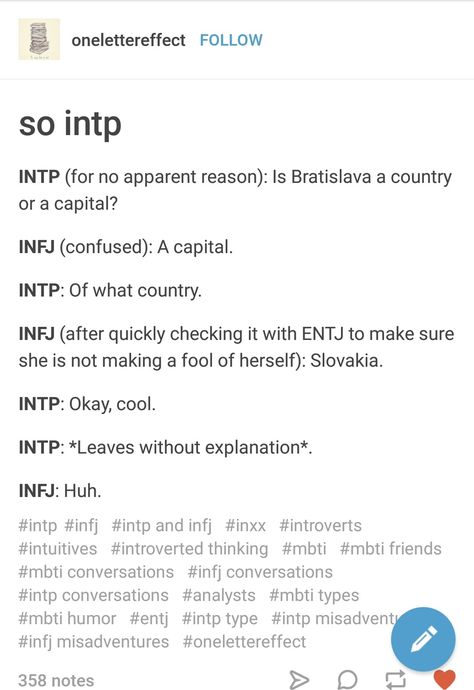 I recall knowing my parents were in danger one night and then finding out the next day that they had been in a car accident.
I recall knowing my parents were in danger one night and then finding out the next day that they had been in a car accident.
Kind of weird, I admit.
Like anyone, I’ll mess up sometimes and misread something or someone. However, being Ni dominant means I think in these symbols and I’ve learned to trust these gut intuitions and hunches about life and what’s happening or could happen. INJs are always trying to think of the big picture and put together a future plan or idea composed of all the bits of sensory information we’re receiving. We support our Ni with either Extraverted Feeling (for INFJs) or Extraverted Thinking (for INTJs). These auxiliary functions help us to actually do something with our visions instead of just leaving them there. For the INFJ, feeling motivates them to connect with people or inspire them with our ideas. For the INTJ, thinking helps them to map out strategies or create innovative systems. The auxiliary function is there to help INJs bring their inner visions into the world in a tangible, real way.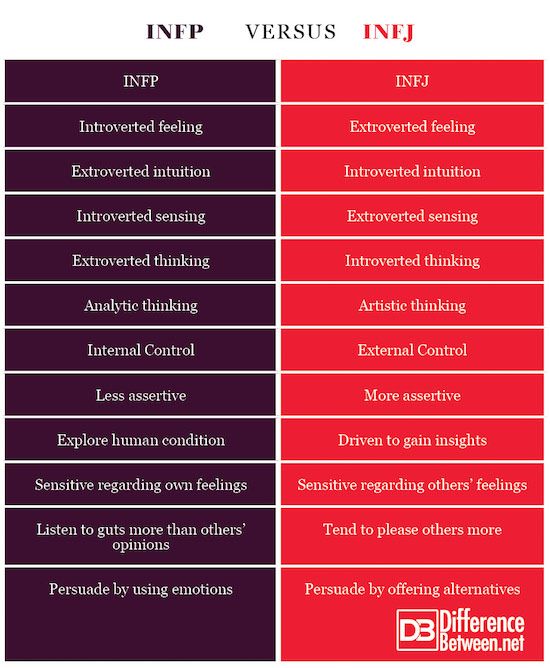
All this picking up clues and connecting dots can reveal startling or upsetting future outcomes. I’ve guessed at things happening; relationships ending in very specific ways for people I know, ambitions and dreams failing, someone being in a dangerous situation or hurt. While all types can occasionally do this, Ni dominant types are often are plagued by this problem the most.
Our struggles come when we try to explain our insights and they are misunderstood because we rely so much on abstract material. You see, we don’t always know why or how we got the particular idea we currently have. Dredging up all the sensing data from our inferior function (Extraverted Sensation) can seem overwhelming. We know the facts are there, but organizing all the data and explaining it in concrete terms can feel like an exercise in futility. Nevertheless we are usually quite sure of our premonitions or predictions. Thankfully, with growth and maturity we usually get better and more proficient at explaining ourselves to people who are unlike us in their mental hardware.
Thankfully, with growth and maturity we usually get better and more proficient at explaining ourselves to people who are unlike us in their mental hardware.
Each personality type has unique talents that makes them shine. For some types, organizing life efficiently and streamlining tasks comes easily. For other types emotional awareness and leadership of groups comes easily.
If you’re an INJ, the magic of Ni appears when someone explains to you an idea they’ve had, and you know it will work because you can see what’s led to this point, and where things will likely go. It provides a sense of joy when you can be enthusiastic about someone’s dream, maybe even your own, because you have a visionary insight into how that dream will become a reality.
Introverted Intuition helps you to see past this moment in time to avenues of possibility into the future that others are blind to. Ni is powerful when it works with other functions like thinking, sensing, or feeling to concoct original plans or innovations.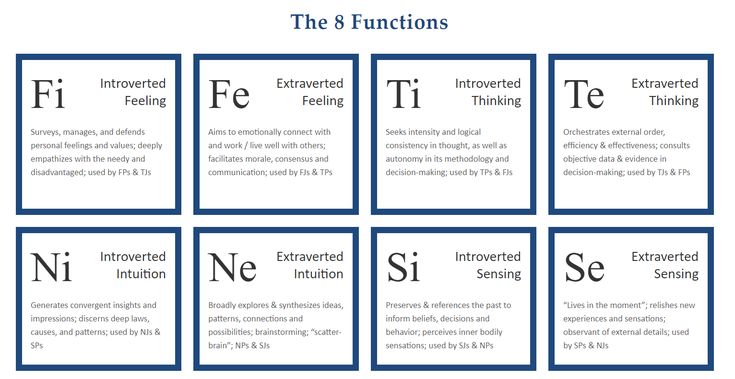 It helps you to see past what’s right in front of you and discover more than what’s on the surface. Yes, sometimes it can be misleading, but other times it feels like it’s a magical door that can unlock your true purpose, your biggest hope or dream, or an understanding of someone that nobody else has ever grasped.
It helps you to see past what’s right in front of you and discover more than what’s on the surface. Yes, sometimes it can be misleading, but other times it feels like it’s a magical door that can unlock your true purpose, your biggest hope or dream, or an understanding of someone that nobody else has ever grasped.
How do you feel about introverted intuition? Have you had any experiences with it that you’d like to share? I’d love to talk to you and find out more in the comments!
Want to find out more about your intuition? Check out 10 Introverted Intuition Hacks for INFJs and INTJs
Find out more about your personality type in our eBooks, Discovering You: Unlocking the Power of Personality Type, The INFJ – Understanding the Mystic, The INFP – Understanding the Dreamer, and The INTJ – Understanding the Strategist. You can also connect with me via Facebook, Instagram, or Twitter!
Want more articles like this?
What Type of Intuitor Are You? Understanding the Difference Between Extraverted and Introverted Intuition
INFJ vs INTJ: Which One Are You?
- More
Conversations with Carl Jung on the "Intuitive Extrovert" and "Intuitive Introvert.
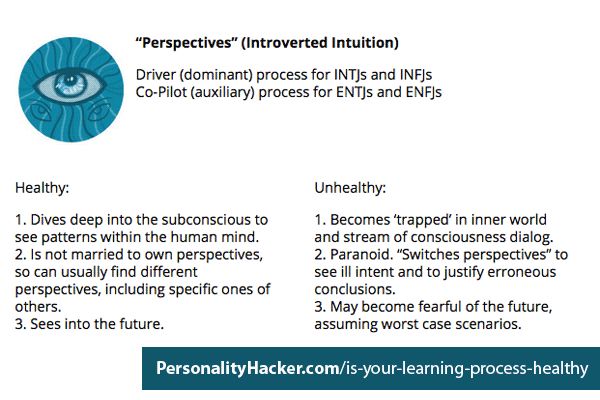 "
"Ever since I have started studying Psychology back in school, I have always had this fascination towards Carl Jung's ideas towards Cognitive functions. That how people perceive and judge the world from their own subjective lenses. For readers who aren't aware of Jungian Cognitive functions, they are defined as "thinking", "feeling", "sensation" and "intuition". Using metaphors for names, Jung described two kinds of cognitive processes—perception and judgment. Sensation and Intuition were the two kinds of perception. Thinking and Feeling were the two kinds of judgment. He said that every mental act consists of using at least one of these four cognitive processes. Then he described eight personality types that were characterized by using one of the processes in either the extraverted or introverted world; extraverted Sensing types, introverted Sensing types, extraverted intuiting types, introverted intuiting types, extraverted Thinking types, introverted Thinking types, extraverted Feeling types, and introverted Feeling types.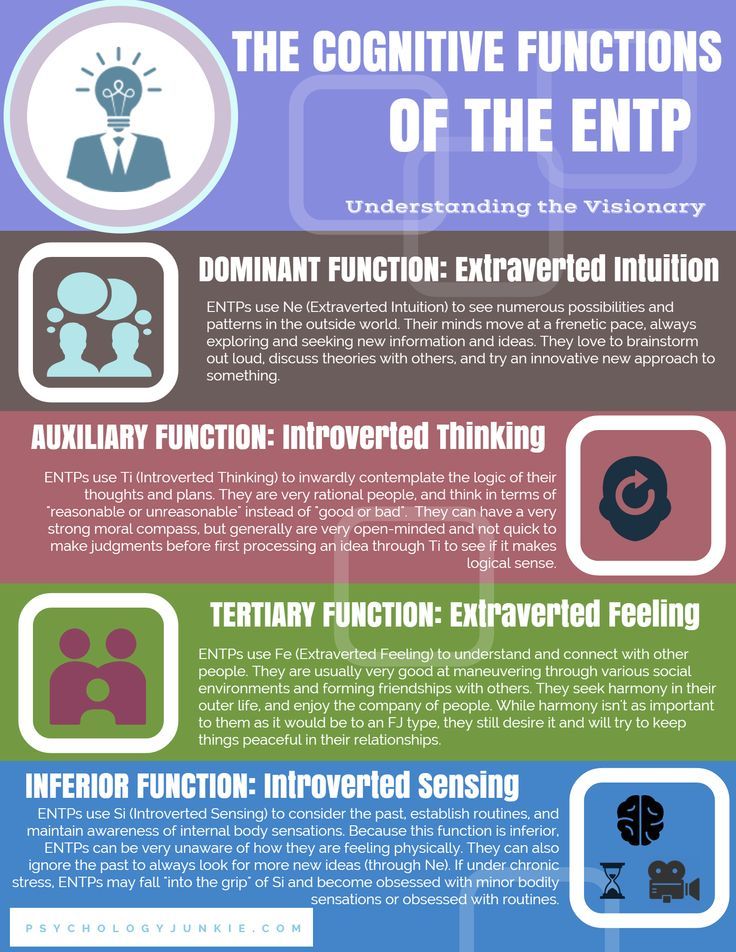 He also suggested that these processes operate not just as the dominant process in a personality but also in other ways. In this post, I am only focusing on 'Intuition".
He also suggested that these processes operate not just as the dominant process in a personality but also in other ways. In this post, I am only focusing on 'Intuition".
What is 'Intuition'?
In Carl Jung's theory of the ego, described in 1916 in Psychological Types, intuition is an "irrational function", opposed most directly by sensation, and opposed less strongly by the "rational functions" of thinking and feeling. Jung defined intuition as "perception via the unconscious": using sense-perception only as a starting point, to bring forth ideas, images, possibilities, ways out of a blocked situation, by a process that is mostly unconscious. Jung said that a person in whom intuition is dominant, an "intuitive type", acts not on the basis of rational judgment but on sheer intensity of perception.
Here is one of Jung's quotes on Intuition:
Intuition gives outlook and insight; it revels in the garden of magical possibilities as if they were real.[“The Psychology of the Transference,” CW 16, par. 492.]
If you too are inspired by Jung and his ideas, this is for you. It is an excerpt from Carl Jung and Dr. Richard I. Evans (Dept. of Psychology, University of Houston) conversations on "Intuitive Extrovert" and "Intuitive Introvert."
Dr. Evans: More specifically, what would be an example of the difference between an intuitive extrovert and an intuitive introvert?
Dr. Jung: Well, you have chosen a somewhat difficult case, because one of the most difficult types is the intuitive introvert.
The intuitive extrovert you find in all kinds of bankers, gamblers, etc., which is quite understandable.
The introvert is more difficult because he has intuitions as to the subjective factor, namely the inner world; and, of course, that is very difficult to understand because what he sees are most uncommon things, things which he doesn’t like to talk about if he is not a fool. If he did, he would spoil his own game by telling what he sees, because people won’t understand it.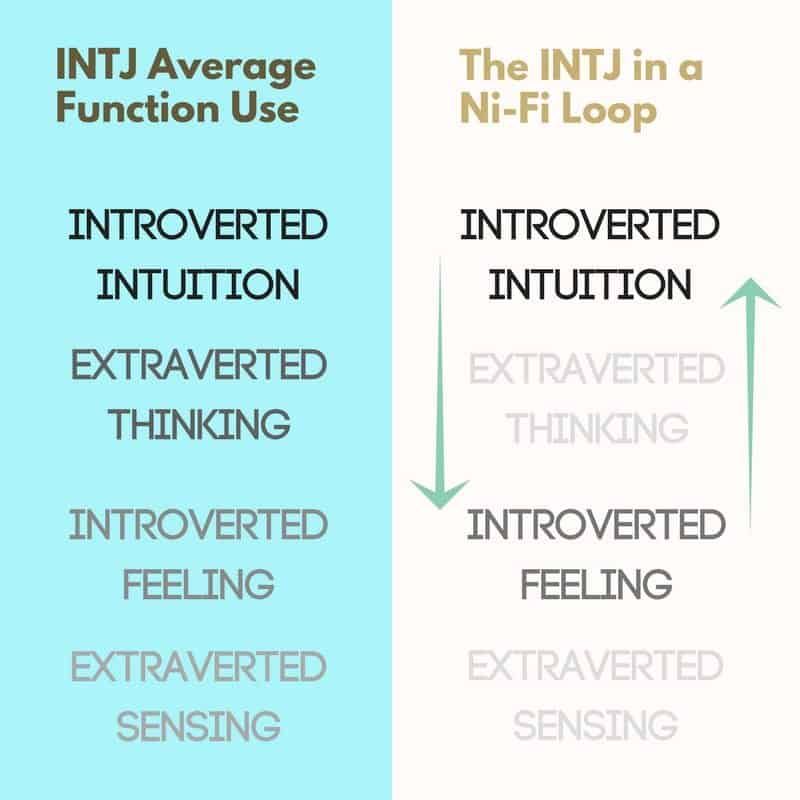
For instance, once I had a patient, a young woman about 27 or 28. Immediately after I had seated her, she said, “You know, doctor, I came to you because I’ve a snake in my abdomen.”
What! “Yes, a black snake coiled up in the bottom of my abdomen.”
I must have made an awful face at her, so she said, “You know that I don’t mean it literally.”
I then replied, however, “If you say it was a snake, it was a snake.” (note: a person dominant at Sensing function would perceive it just like the way it is. Literally!)*
In a later conversation with her, which took place about in the middle of her treatment, treatment that only lasted for ten consultations, she reminded me of something she had foretold me.
She had said, “I come ten times and then it will be all right,” to which I responded with the question, “How do you know?”
“Oh, I’ve got a hunch,” she said. (Intuition)*
Now at about the fifth or sixth hour she said, “Doctor, I must tell you that the snake has risen; it is now about here.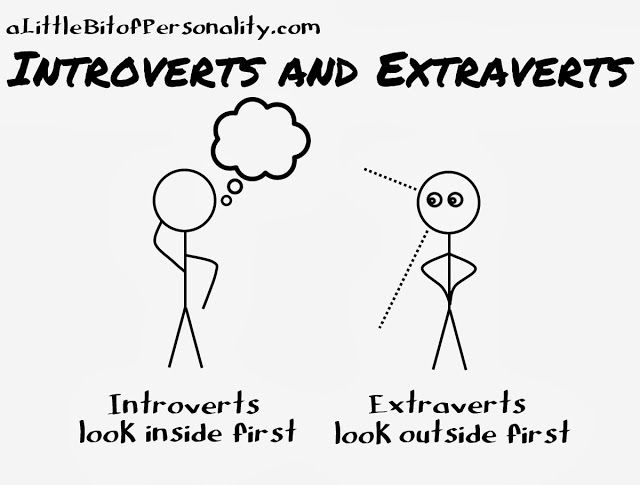 ”
”
A hunch.
Then on the tenth day I said, “Now this is our last hour, and do you feel cured?”
Just beaming, she replied, “You know, this morning it came up, came out of my mouth, and the head was golden.”
Those were her last words.
When it comes to reality now, that same girl came to me because she couldn’t hear the step of her feet anymore, because she walked on air, literally. She couldn’t hear it, and that frightened her.
When I asked for her address, she said, “Oh, Pension so and so. Well, it is not just called a pension, but it is a sort of pension.”
I had never heard of it.
“I have never heard of that place,” I said.
She replied, “It is a very nice place.
There are only young girls there; they are all very nice young girls, very lovely young girls, and they have a merry time.
I often wish they would invite me to their merry evenings.”
And I said, “Do they amuse themselves all alone?”
“No,” she replied, “there are plenty of young gentlemen coming in; they have a beautiful time, but they never invite me.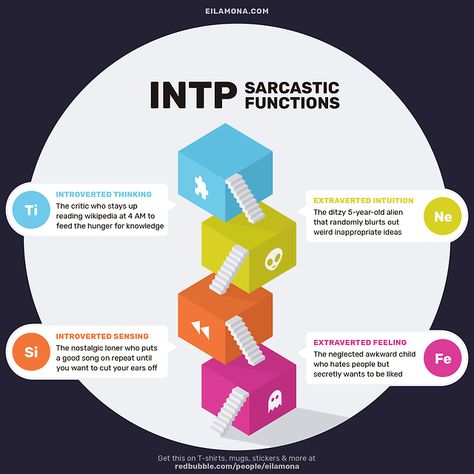 ”
”
It turned out that this was a private brothel.
She was a perfectly decent girl from a very good family, not from here.
She had found that place, I don’t know how, and she was completely unaware that they were all prostitutes.
I said, “For heaven’s sake, you fell into a very tough place; you’ll hasten to get out of it.”
She didn’t see reality, but she had hunches like everything, vraiment.
Such a person cannot possibly speak of her experiences because everybody would think she was absolutely crazy.
I myself was quite shocked, and I thought, “For heaven’s sake, is that case a schizophrenic?”
You don’t normally hear that kind of speech; but she assumed that the old man, of course, knew everything and did understand such kind of language.
So you see, if the introverted intuitive would speak what he really perceives, practically no one would understand him; he would be misunderstood.
Thus they learn to keep things to themselves.
You hardly ever hear them talking of these things.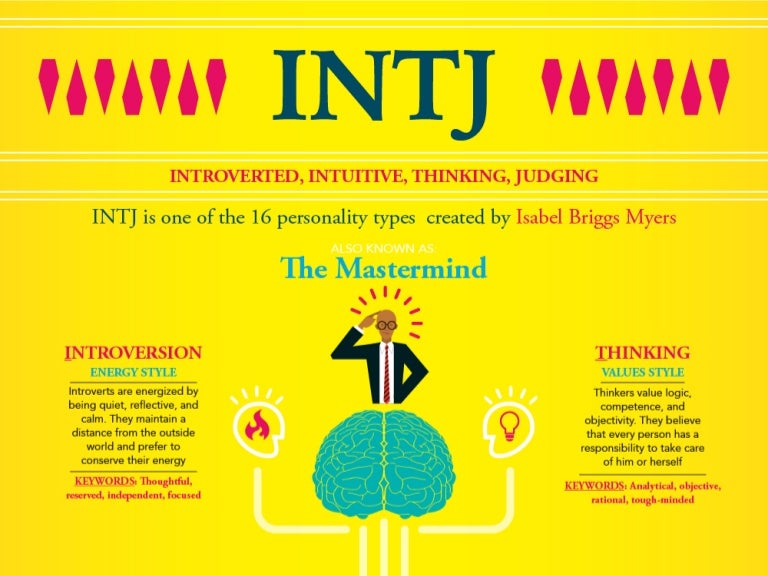
In a way, that is a great disadvantage, but in another way it is an enormous advantage that these people do not speak of their experiences, both their inward experiences and those which occur in human relations.
For instance, they may come into the presence of somebody they don’t know, not from Adam, and suddenly they may have inner images.
Now these inner images may give them a great deal of information about the psychology of that person they have just met.
That is typical of cases that often happen.
They suddenly know an important piece of the biography of that person, and if they did not keep things to themselves, they would tell the story.
Then the fat would be in the fire!
So the intuitive introvert has in a way a very difficult life, although it is a most interesting one.
It is quite difficult to get into their confidence.
Dr. Evans: Yes, because they are afraid people will think . . .
Dr. Jung: They are sick.
The things that they hint at are interesting to them, are vital to them, and are utterly strange to the ordinary individual. A psychologist, however, should know of such things.
When people make a psychology, as a psychologist ought to do, it is the very first question—is he introverted or extroverted?
The psychologist must look at entirely different things.
He sees the sensation type; he sees the intuitive type; he sees thinking and feeling types.
These things are complicated.
They are still more complicated because the introverted thinking, for instance, is compensated by extroverted feeling, inferior, archaic, extroverted feeling.
So an introverted thinker may be crude in his feeling, like for instance the introverted philosopher who is always carefully avoiding women may be married by his cook in the end.
Dr. Evans: So we can take your introvert-extrovert orientations and describe a number of types; the sensation-introvert and extrovert types, the feeling-introvert and extrovert types, thinking-introvert and extrovert types, and the intuitive-introvert and extrovert types.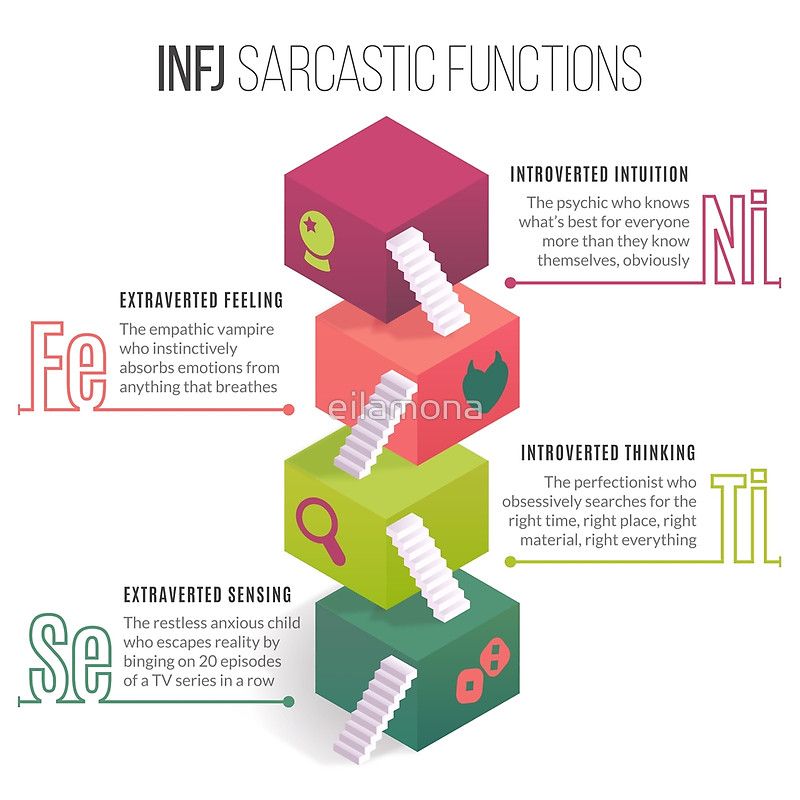 In each case these combinations do not represent a concrete category but simply, as you have indicated, a model that can be helpful in understanding the individual.
In each case these combinations do not represent a concrete category but simply, as you have indicated, a model that can be helpful in understanding the individual.
Dr. Jung: It is just a sort of skeleton to which you have to add the flesh.
One could say that it is like a country mapped out by triangulation points, which doesn’t mean that the country consists of triangulation points; that is only in order to have an idea of the distances.
And so it is a means to an end.
It only makes sense as a scheme when you deal with practical cases.
For instance, if you have to explain an introverted-intuitive husband to an extrovert wife, it is a most painstaking affair because, you see, an extrovert sensation type is furtherest away from the ‐ inner experience and the rational functions.
He adapts and behaves according to the facts as they are, and he is always caught by those facts.
He himself is those facts.
But if the introvert is intuitive, to him that is hell, because as soon as he is in a definite situation, he tries to find a hole where he can get out.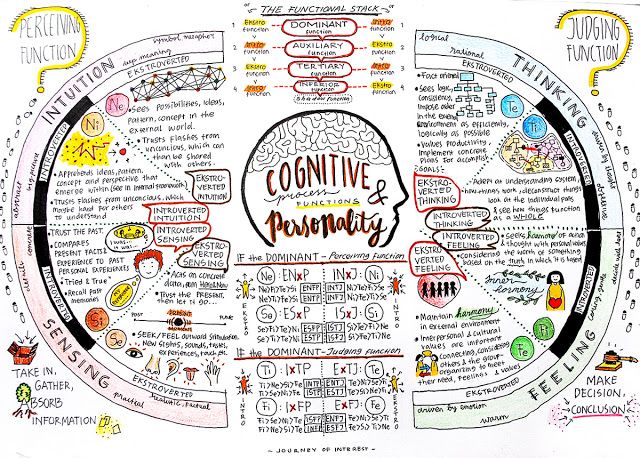
To him, every given situation is just the worst that can happen to him.
He is pinched and feels he is caught, suffocated, chained.
He must break those fetters, because he is the man who will discover a new field. He will plant that field, and as soon as the new plants are coming up, he’s done; he’s over and no more interested.
Others will reap what he has sown.
When those two marry, the extrovert-sensation and the introvert-intuitive, there is trouble, I can assure you. (Happens at workplace too.)*
Note: Comments with a "*" aren't part of the excerpt.
_______________________________________________________
What do you think of Psychological Types? What type are you? Have you ever been misunderstood by someone who has a different personality type than yours? How do you bridge the communication gap?
Share your views in the comments section below:-
Jung intuition, intuitive | Intuition psychoanalysis
“Intuition (from Latin intueri - to contemplate) is, in my understanding, one of the main psychological functions.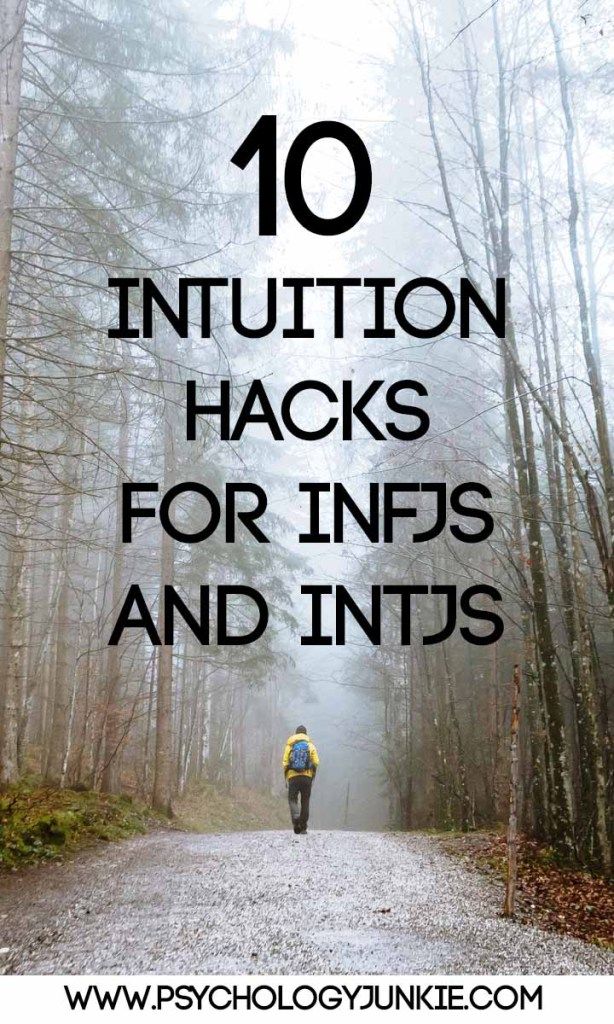 Intuition is that psychological function which conveys perception to the subject in an unconscious way. Everything can be the subject of such perception, both external and internal objects or their combinations.
Intuition is that psychological function which conveys perception to the subject in an unconscious way. Everything can be the subject of such perception, both external and internal objects or their combinations.
The peculiarity of intuition is that it is neither sensory sensation, nor feeling, nor intellectual conclusion, although it can manifest itself in these forms. In intuition, a content presents itself to us as a complete whole, without first being able to indicate or reveal how this content was created.
Intuition is a kind of instinctive grasp, no matter what the content. Like sensation, it is an irrational function of perception. Its contents, like the contents of sensation, have the character of a given, in contrast to the character of "derivation", "produced", inherent in the contents of feeling and thought.
Intuitive cognition has the character of certainty and certainty, which gave Spinoza (similar to Bergson ) the possibility to consider "scientia intuitive" as the highest form of cognition.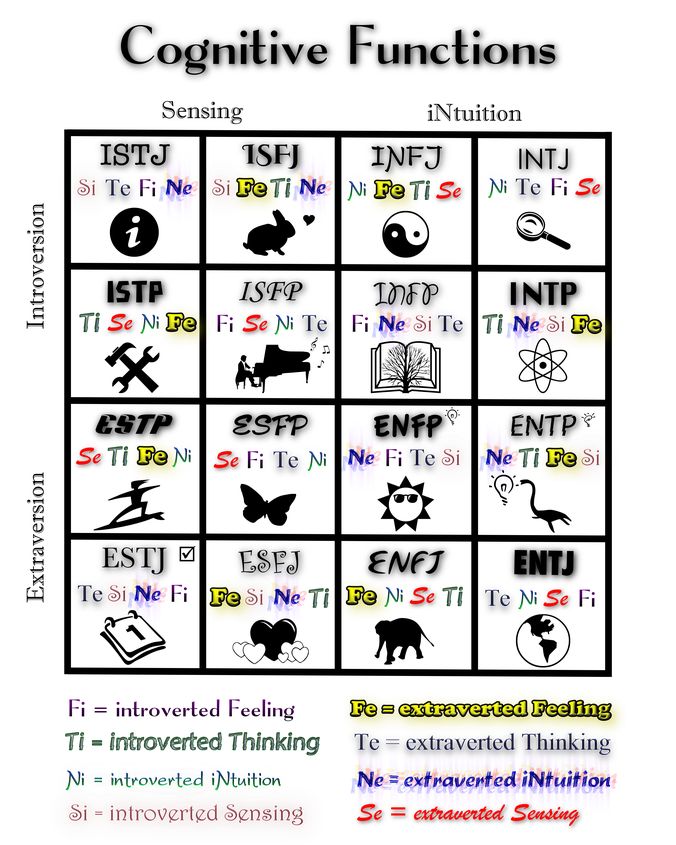 This property is equally inherent in intuition and sensation, the physical basis of which is precisely the basis and reason for its certainty. Like this The reliability of intuition rests on certain psychic data, the realization and existence of which, however, remained unconscious.
This property is equally inherent in intuition and sensation, the physical basis of which is precisely the basis and reason for its certainty. Like this The reliability of intuition rests on certain psychic data, the realization and existence of which, however, remained unconscious.
Intuition manifests itself in a subjective or objective form: the former is the perception of unconscious psychic data, which are essentially subjective in origin, the latter is the perception of factual data based on subliminal perceptions received from the object and on subliminal feelings and thoughts caused by these perceptions.
One should also distinguish between concrete and abstract forms of intuition, depending on the degree of involvement of sensation. Concrete intuition conveys perceptions relating to the factual side of things; abstract intuition conveys the perception of ideal connections. Concrete intuition is a reactive process, because it arises without further, directly from the actual data.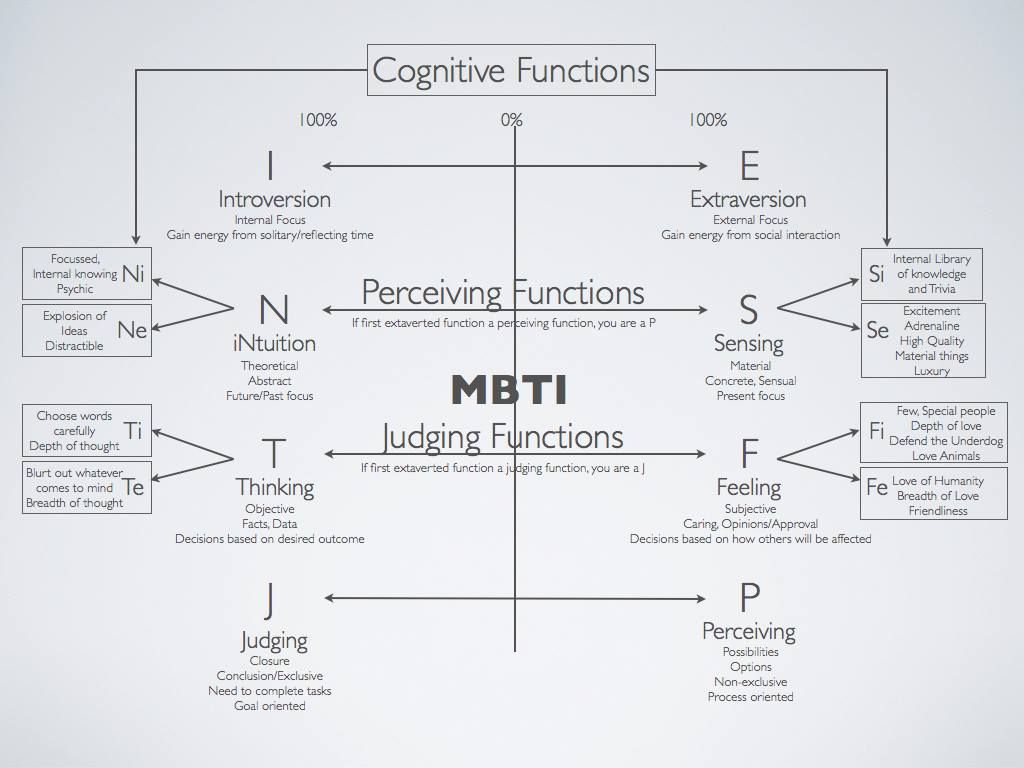 On the other hand, abstract intuition needs, like abstract sensation, some guiding element—will or intention.
On the other hand, abstract intuition needs, like abstract sensation, some guiding element—will or intention.
Intuition, along with sensation, is characteristic of infantile and primitive psychology. In contrast to the impressions of sensation, vivid and imposing, it gives the child and primitive man the perception of mythological images that constitute the preliminary stage of ideas. Intuition relates to sensation in a compensatory way; like sensation, it is the mother soil from which thinking and feeling grow as rational functions.
Intuition is an irrational function, although many intuitions can later be decomposed into their components, so that their occurrence can be consistent with the laws of reason.
A person who orients his general attitude on the principle of intuition, that is, on perception through the unconscious, belongs to the intuitive type. Depending on how a person uses intuition - whether he turns it inward, into cognition or inner contemplation, or outward, into action and execution - one can distinguish between introverted and extraverted intuitive people.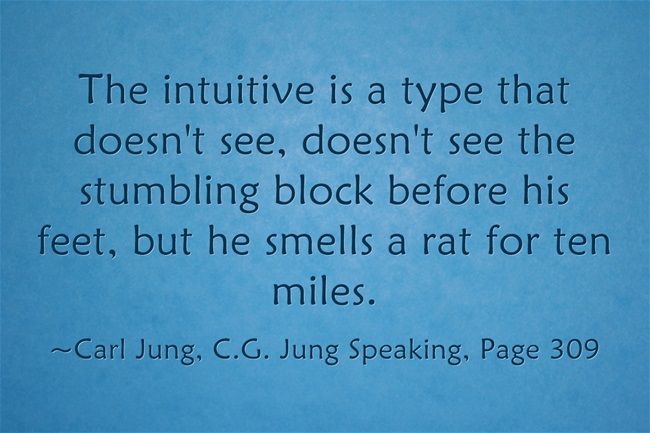
In abnormal cases, there is a strong fusion with the contents of the collective unconscious and an equally strong conditioning of these contents, as a result of which the intuitive type may seem highly irrational and incomprehensible.
Carl Jung, Psychological types, St. Petersburg "Juventa"; M., Progress-Univers, 1995, p. 526-528. Jung's "pure" types - An introduction to typology He depicts each type in extreme, sharp manifestations, with maximum contrasts between extraverted and introverted forms of behavior, and in connection with this he describes theoretical "pure" types with a poorly developed auxiliary function.
Ignoring the auxiliary function led, first of all, to distorted descriptions of introverted types. We already know that extraversion, that is, the external manifestations of personality, in introverts depends on an auxiliary function. In "pure" introverted types, the auxiliary function is not developed, so interaction with the outside world is difficult.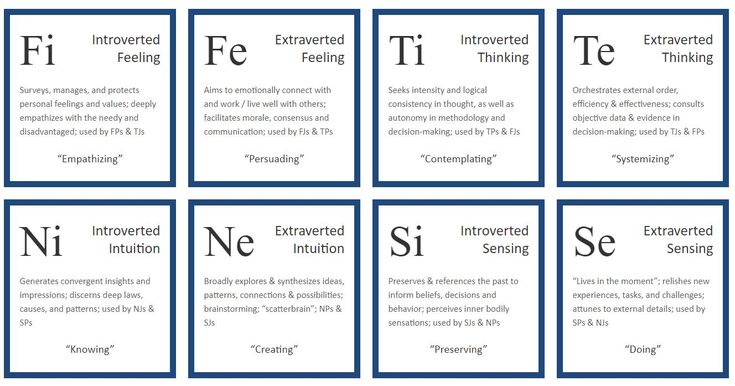 Outwardly, we can only observe the attempts of the main function (directed in introverts to the inner world) to interact with the outside world. Thus, Jung's "pure" introvert types have practically no effect on the outside world.
Outwardly, we can only observe the attempts of the main function (directed in introverts to the inner world) to interact with the outside world. Thus, Jung's "pure" introvert types have practically no effect on the outside world.
"Pure" extraverted types have difficulty interacting with the inner world. Outwardly, we may not notice this. Therefore, the extraverted types described by Jung more or less coincide with the description of normal extraverted types.
Extraverted thinking type
Reformer - "pure" extraverted mental type, which has not developed an auxiliary function.
This is a rational type, since he makes a choice from what is happening on the basis of reasonable judgments. In contrast, the irrational type is guided by what exactly is happening at the moment. That is, for the rational type, reasonable judgments are more important than the perception of what is happening around. They consciously exclude everything random and disorderly from their lives.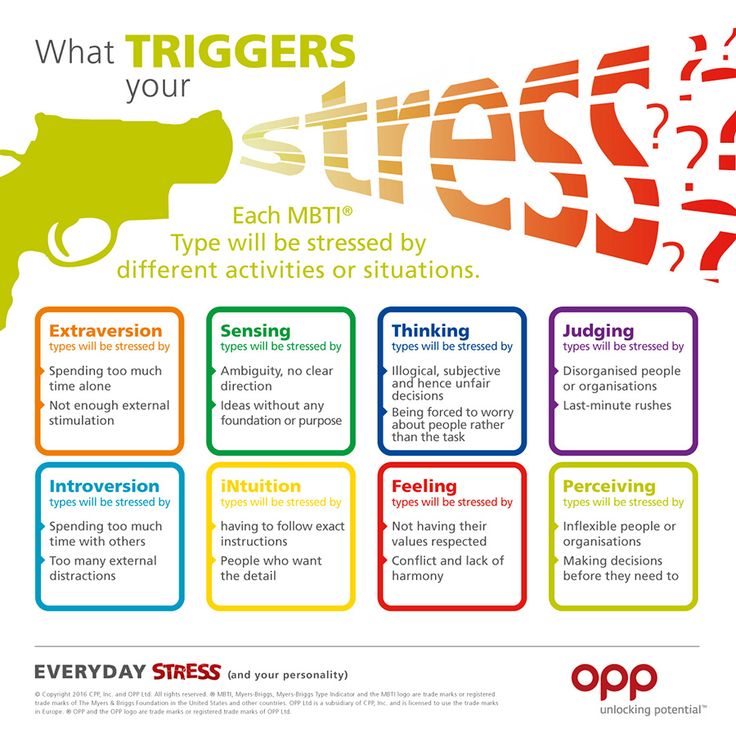
Extraverted thinking is always connected with external worlds: either with objective facts or with generally accepted ideas. Such thinking is understandable to other people and, as a rule, is productive, that is, it leads to new objective facts.
A person of this type gives decisive power to objective reality or, accordingly, to its objectively oriented intellectual formula, not only in relation to himself, but also in relation to the environment. This formula measures good and evil, it determines the beautiful and the ugly. Everything that corresponds to this formula is true, everything that contradicts it is wrong, and everything that passes by it indifferently is accidental.
If the formula is broad enough, then this type can play an extremely useful role in public life as a reformer, public accuser and purifier of conscience, or propagandist of important innovations. But the narrower the formula, the sooner this type turns into a grumbler, rationalist and self-satisfied critic.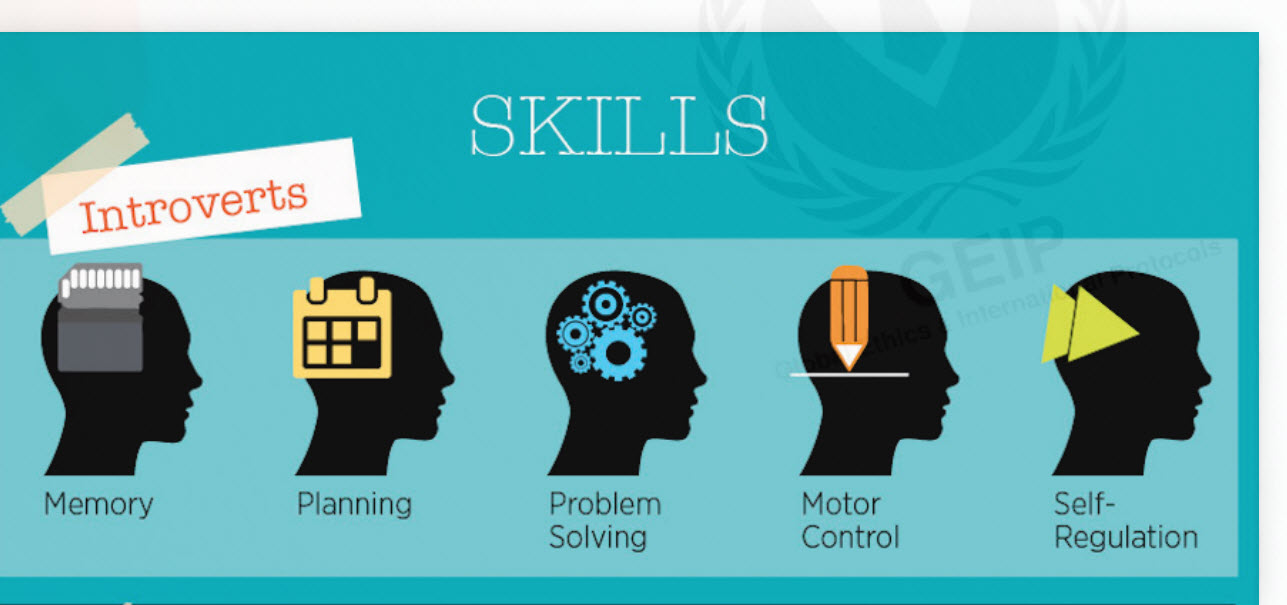 Moreover, the purely empirical accumulation of facts cripples thought and stifles meaning.
Moreover, the purely empirical accumulation of facts cripples thought and stifles meaning.
This type of preference in dichotomies would have the following:
E (Extraversion, extraversion) - orientation to external objects. Such people are open, more active, easily communicate with strangers. They like to spend time in the outer world of people and things rather than in the inner world of ideas and images.
Orientation of consciousness
I (Introversion, introversion) - orientation to your inner world. Such people are closed, less active, communication with strangers is tiring and wastes energy. They like to spend time in the inner world of ideas and images rather than in the outer world of people and things.
S (Sensing, feeling) - orientation based on specific details, facts and experience. Such people are more practical than theoretical. They are absorbed by the real world around them, while they may not see the whole picture and the development of the situation in time. They prefer to observe life, they seek pleasure.
They prefer to observe life, they seek pleasure.
Orientation in the situation (perception)
Perception is not properly developed.
N (iNtuition, intuition) - orientation based on generalized information, premonition, intuition. Such people are more theorists than practitioners. They see the image as a whole, new opportunities and the development of the situation in time, while “leaving” reality. They prefer to predict events in life, looking for inspiration.
T (Thinking, thinking) - decisions are made by the "head", based on logic, having carefully considered everything. Such people are cold-blooded, but fair. They are fascinated by the objective laws of the world (science, technology).
Decision-making basis (judgment)
F (Feeling, feeling) - decisions are made "with the heart", emotionally, focused on people's values, and not on abstract logic.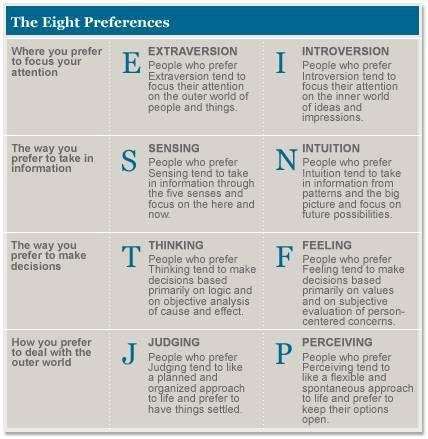 Such people are sympathetic and empathetic. They are fascinated by humanitarian activities (literature, art).
Such people are sympathetic and empathetic. They are fascinated by humanitarian activities (literature, art).
J (Judging, judgment) - a rational function is directed to the outside world, that is, a judgment: thinking or feeling. Such people act on preliminary preparation, prefer to plan everything in advance, try to eliminate chaos. Unexpected changes unsettle them.
Method of action in the outside world
P (Perception, perception) - an irrational function is directed to the outside world, that is, perception: sensation or intuition. Such people strive to live flexible and spontaneous, act according to circumstances, easily adapt to unexpected changes. Action according to the plan constrains and limits them.
Extraverted feeling type
Theatrical - "pure" extraverted feeling type, in which the auxiliary function is not developed.
This is a rational type, since he makes a choice from what is happening on the basis of reasonable judgments. In contrast, the irrational type is guided by what exactly is happening at the moment. That is, for the rational type, reasonable judgments are more important than the perception of what is happening around. They consciously exclude everything random and disorderly from their lives.
In contrast, the irrational type is guided by what exactly is happening at the moment. That is, for the rational type, reasonable judgments are more important than the perception of what is happening around. They consciously exclude everything random and disorderly from their lives.
Extraverted feeling does not depend on the subjective factor, but is subordinated to traditional and generally significant values.
It is to this kind of feeling that so many people go to the theatre, or to a concert, or to church, and even with properly measured positive feelings, must be attributed. We also owe him fashions and, much more valuable, positive and widespread support for social, philanthropic and other cultural undertakings. In these cases, extraverted feeling is the creative factor. Without such a feeling, for example, beautiful and harmonious communication is unthinkable.
In the extreme case, such an assimilation of the subject to the object takes place that the subject of feeling itself disappears, as a result of which the personal character of feeling, which is its main charm, is lost. For as a result, the feeling becomes cold, objective and unreliable. It seems as if this feeling is not real, but put on display. This manifests itself primarily in exaggerated expression of feelings, for example, in loud and intrusive sensitive predicates, which, however, to a certain extent do not inspire confidence. They sound empty and not convincing. It is worth the situation to change a little in order to immediately evoke a completely opposite assessment of the same object.
For as a result, the feeling becomes cold, objective and unreliable. It seems as if this feeling is not real, but put on display. This manifests itself primarily in exaggerated expression of feelings, for example, in loud and intrusive sensitive predicates, which, however, to a certain extent do not inspire confidence. They sound empty and not convincing. It is worth the situation to change a little in order to immediately evoke a completely opposite assessment of the same object.
This type of preference in dichotomies would have the following:
E (Extraversion, extraversion) - orientation to external objects. Such people are open, more active, easily communicate with strangers. They like to spend time in the outer world of people and things rather than in the inner world of ideas and images.
Orientation of consciousness
I (Introversion, introversion) — orientation to your inner world. Such people are closed, less active, communication with strangers is tiring and wastes energy. They like to spend time in the inner world of ideas and images rather than in the outer world of people and things.
Such people are closed, less active, communication with strangers is tiring and wastes energy. They like to spend time in the inner world of ideas and images rather than in the outer world of people and things.
S (Sensing, feeling) - orientation based on specific details, facts and experiences. Such people are more practical than theoretical. They are absorbed by the real world around them, while they may not see the whole picture and the development of the situation in time. They prefer to observe life, they seek pleasure.
Orientation in the situation (perception)
Perception is not properly developed.
N (iNtuition, intuition) - orientation based on generalized information, premonition, intuition. Such people are more theorists than practitioners. They see the image as a whole, new opportunities and the development of the situation in time, while “leaving” reality.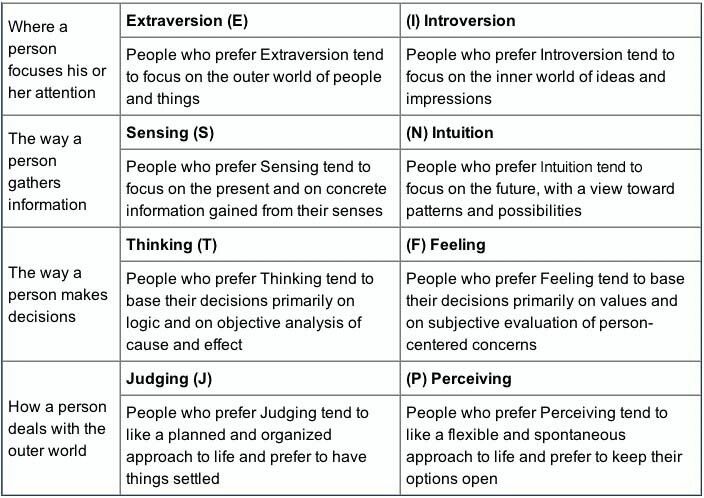 They prefer to predict events in life, looking for inspiration.
They prefer to predict events in life, looking for inspiration.
T (Thinking, thinking) - decisions are made by the "head", based on logic, carefully considering everything. Such people are cold-blooded, but fair. They are fascinated by the objective laws of the world (science, technology).
Decision-making basis (judgment)
F (Feeling, feeling) - decisions are made "with the heart", emotionally, focused on the values of people, and not on abstract logic. Such people are sympathetic and empathetic. They are fascinated by humanitarian activities (literature, art).
J (Judging, judgment) - a rational function is directed to the outside world, that is, a judgment: thinking or feeling. Such people act on preliminary preparation, prefer to plan everything in advance, try to eliminate chaos. Unexpected changes unsettle them.
Method of action in the external world
P (Perception, perception) - an irrational function is directed to the external world, that is, perception: sensation or intuition.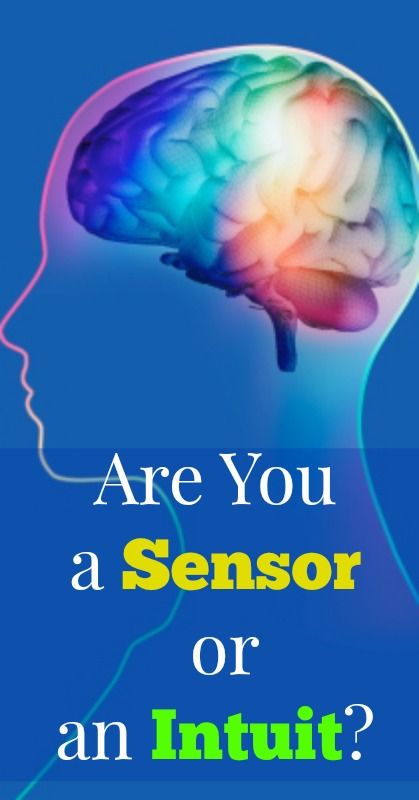 Such people strive to live flexible and spontaneous, act according to circumstances, easily adapt to unexpected changes. Action according to the plan constrains and limits them.
Such people strive to live flexible and spontaneous, act according to circumstances, easily adapt to unexpected changes. Action according to the plan constrains and limits them.
Extraverted feeling type
Aesthete - "pure" extraverted feeling type, which has not developed an auxiliary function.
This is an irrational type, because he is guided by what exactly is happening at the moment. In contrast, the rational type makes a choice from what is happening on the basis of reasonable judgments. That is, for the irrational type, the perception of what is happening around is more important than reasonable judgments. But it would be completely wrong to interpret these types as "unreasonable" because of this, their reasoning simply cannot keep up with experience.
In the extraverted attitude, sensation is predominantly determined by the object, and those objects that evoke the strongest sensation are decisive for the psychology of the individual.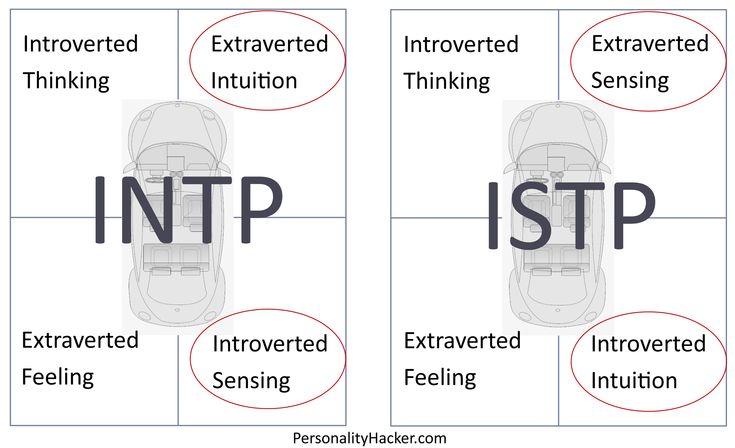
There is no human type that can compare in realism with the extroverted feeling type. For him, concrete sensations are manifestations of life, and nothing else. What comes from within seems painful and worthless to him. His constant motive is to feel the object, to have sense impressions, and to enjoy as much as possible.
Usually he appears as a tasteful aesthete, he has a refined taste, he dresses well, according to his means, he eats and drinks well, he sits comfortably.
In the extreme manifestation, the object serves only as an occasion for sensations, such a person turns into a rude seeker of pleasure. The object is subjected to egregious violence and squeezing.
This type of preference in dichotomies would have the following:
E (Extraversion, extraversion) - orientation to external objects. Such people are open, more active, easily communicate with strangers. They like to spend time in the outer world of people and things rather than in the inner world of ideas and images.
Orientation of consciousness
I (Introversion, introversion) - orientation to your inner world. Such people are closed, less active, communication with strangers is tiring and wastes energy. They like to spend time in the inner world of ideas and images rather than in the outer world of people and things.
S (Sensing, feeling) - orientation based on specific details, facts and experience. Such people are more practical than theoretical. They are absorbed by the real world around them, while they may not see the whole picture and the development of the situation in time. They prefer to observe life, they seek pleasure.
Orientation in the situation (perception)
N (intuition, intuition) - orientation based on generalized information, premonition, intuition. Such people are more theorists than practitioners.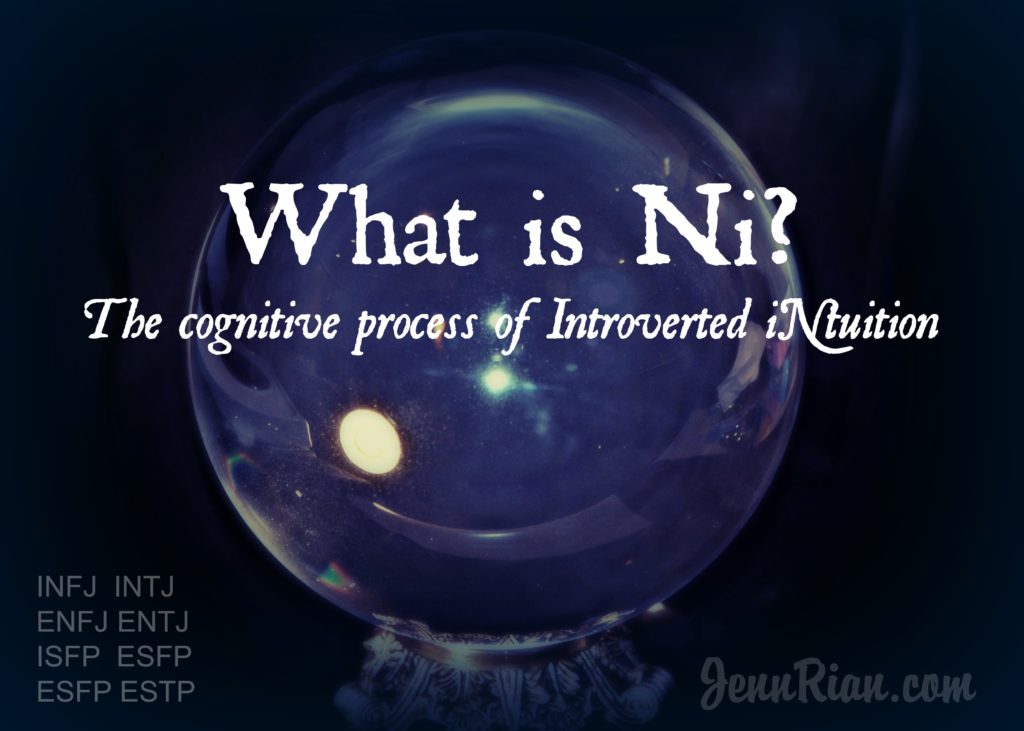 They see the image as a whole, new opportunities and the development of the situation in time, while “leaving” reality. They prefer to predict events in life, looking for inspiration.
They see the image as a whole, new opportunities and the development of the situation in time, while “leaving” reality. They prefer to predict events in life, looking for inspiration.
T (Thinking, thinking) - decisions are made by the "head", based on logic, having carefully considered everything. Such people are cold-blooded, but fair. They are fascinated by the objective laws of the world (science, technology).
Decision-making basis (judgment)
Judgment is not properly developed.
F (Feeling, feeling) - decisions are made "with the heart", emotionally, focused on people's values, and not on abstract logic. Such people are sympathetic and empathetic. They are fascinated by humanitarian activities (literature, art).
J (Judging, judgment) - a rational function is directed to the outside world, that is, a judgment: thinking or feeling.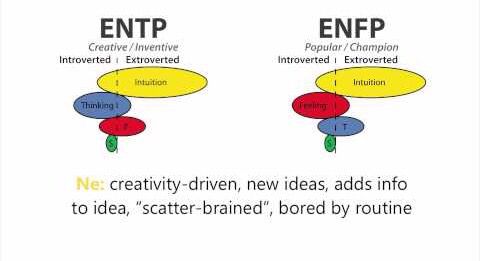 Such people act on preliminary preparation, prefer to plan everything in advance, try to eliminate chaos. Unexpected changes unsettle them.
Such people act on preliminary preparation, prefer to plan everything in advance, try to eliminate chaos. Unexpected changes unsettle them.
Method of action in the outside world
P (Perception, perception) - an irrational function is directed to the outside world, that is, perception: sensation or intuition. Such people strive to live flexible and spontaneous, act according to circumstances, easily adapt to unexpected changes. Action according to the plan constrains and limits them.
Extraverted intuitive type
Adventurer - "pure" extraverted intuitive type, which has not developed an auxiliary function.
This is an irrational type, because he is guided by what exactly is happening at the moment. In contrast, the rational type makes a choice from what is happening on the basis of reasonable judgments. That is, for the irrational type, the perception of what is happening around is more important than reasonable judgments.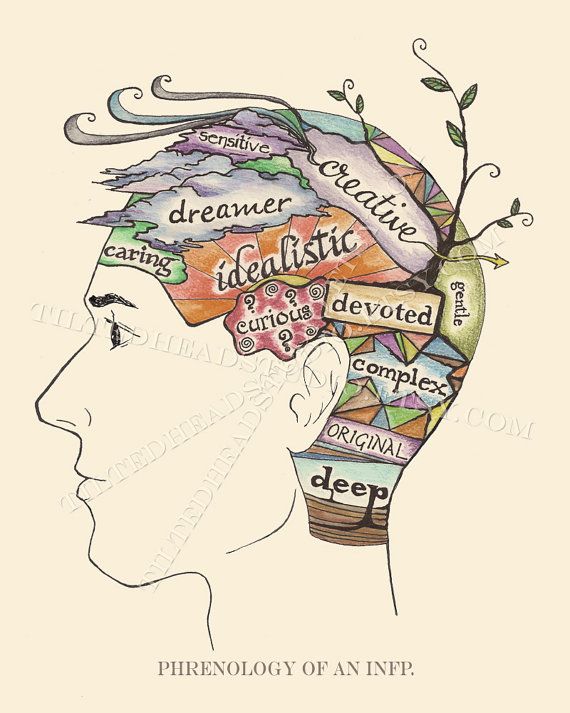 But it would be completely wrong to interpret these types as "unreasonable" because of this, their reasoning simply cannot keep up with experience.
But it would be completely wrong to interpret these types as "unreasonable" because of this, their reasoning simply cannot keep up with experience.
Intuition, as a function of unconscious perception, is directed entirely to external objects in an extraverted attitude. Intuition strives to capture the greatest fullness of the possibilities of an object, because the contemplation of possibilities most satisfies intuition. All ordinary life situations are presented as if they were closed spaces, which intuition must unlock.
The extraverted intuitive type constantly takes on new objects and paths and has a keen sense of potential. But as soon as all possibilities are exhausted and it is no longer possible to foresee their significant development in the future, he immediately calmly abandons the object and does not even remember it anymore.
This type can be an initiator of ideas, an adventurer, a stock trader, a business shark, a producer, a politician, etc.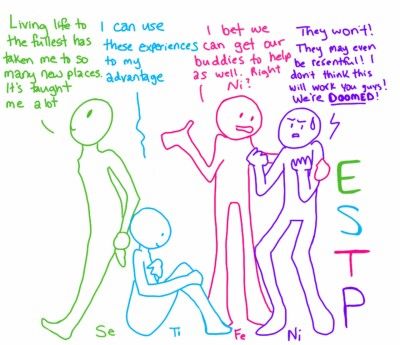 Unfortunately, he has to rush too soon for a new opportunity and leave his newly planted fields from which others will harvest . In the end, he leaves with nothing.
Unfortunately, he has to rush too soon for a new opportunity and leave his newly planted fields from which others will harvest . In the end, he leaves with nothing.
This type of preference in dichotomies would have the following:
E (Extraversion, extraversion) - orientation to external objects. Such people are open, more active, easily communicate with strangers. They like to spend time in the outer world of people and things rather than in the inner world of ideas and images.
Orientation of consciousness
I (Introversion, introversion) — orientation to your inner world. Such people are closed, less active, communication with strangers is tiring and wastes energy. They like to spend time in the inner world of ideas and images rather than in the outer world of people and things.
S (Sensing, feeling) - orientation based on specific details, facts and experiences. Such people are more practical than theoretical. They are absorbed by the real world around them, while they may not see the whole picture and the development of the situation in time. They prefer to observe life, they seek pleasure.
Such people are more practical than theoretical. They are absorbed by the real world around them, while they may not see the whole picture and the development of the situation in time. They prefer to observe life, they seek pleasure.
Orientation in a situation (perception)
N (intuition, intuition) - orientation based on generalized information, premonition, intuition. Such people are more theorists than practitioners. They see the image as a whole, new opportunities and the development of the situation in time, while “leaving” reality. They prefer to predict events in life, looking for inspiration.
T (Thinking, thinking) - decisions are made by the "head", based on logic, carefully considering everything. Such people are cold-blooded, but fair. They are fascinated by the objective laws of the world (science, technology).
Decision-making basis (judgment)
Judgment is not properly developed.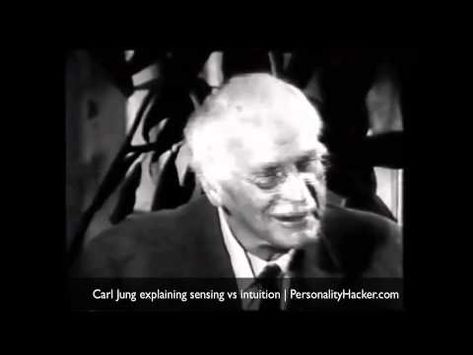
F (Feeling, feeling) - decisions are made "with the heart", emotionally, focused on people's values, and not on abstract logic. Such people are sympathetic and empathetic. They are fascinated by humanitarian activities (literature, art).
J (Judging, judgment) - a rational function is directed to the outside world, that is, a judgment: thinking or feeling. Such people act on preliminary preparation, prefer to plan everything in advance, try to eliminate chaos. Unexpected changes unsettle them.
Method of action in the outside world
P (Perception, perception) - an irrational function is directed to the outside world, that is, perception: sensation or intuition. Such people strive to live flexible and spontaneous, act according to circumstances, easily adapt to unexpected changes. Action according to the plan constrains and limits them.
Introverted thinking type
Theorist - "pure" introverted mental type, which has not developed an auxiliary function.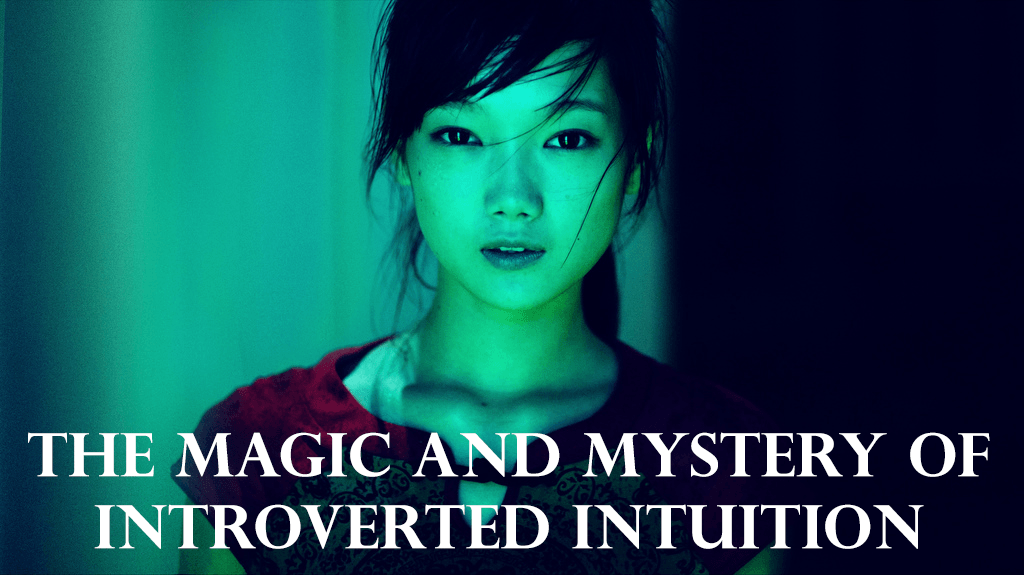
This is a rational type, since he makes a choice from what is happening on the basis of reasonable judgments. In contrast, the irrational type is guided by what exactly is happening at the moment. That is, for the rational type, reasonable judgments are more important than the perception of what is happening around. They consciously exclude everything random and disorderly from their lives.
Introverted thinking is not connected with the external world, but proceeds from the subjectively given and is directed to subjective ideas, and attaches secondary importance to objective facts.
It opens up perspectives and directs the gaze in depth, it rewards theory for the sake of theory.
At the extreme, this thinking becomes so deep in subjective ideas that it revolves in itself and becomes completely useless.
The introverted thinking type, in constructing his world of ideas, is not afraid of even the most daring daring and does not refrain from thinking any kind of thought - because it is dangerous, revolutionary, heretical and offends feelings.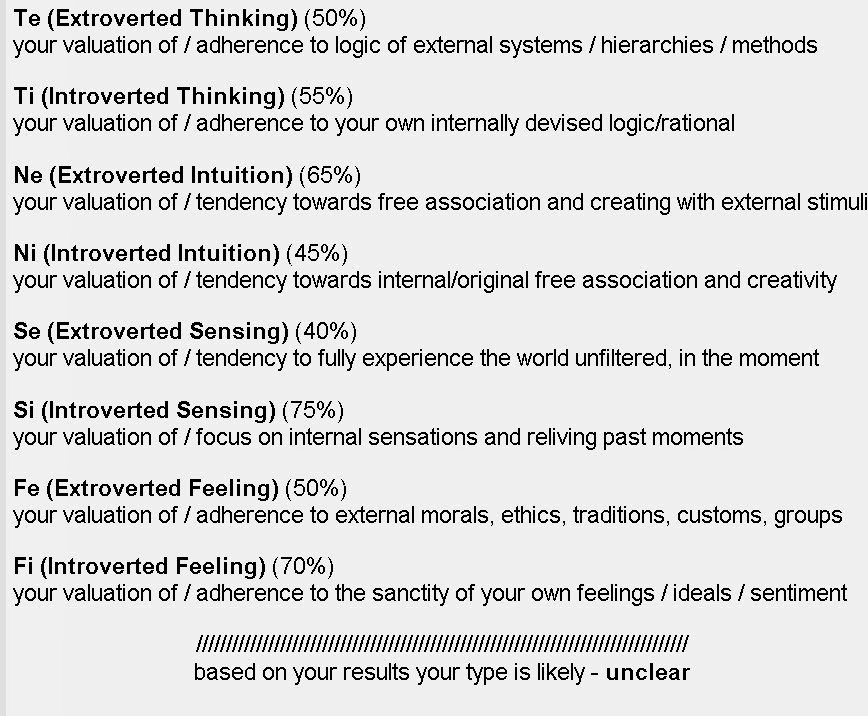 Sometimes these can be brilliant ideas. But he does not strive to release his thoughts into the light, it is contrary to his nature. As far as the internal structure of his thoughts is clear to him, it is just as unclear to him where and how they can be adapted to the real world.
Sometimes these can be brilliant ideas. But he does not strive to release his thoughts into the light, it is contrary to his nature. As far as the internal structure of his thoughts is clear to him, it is just as unclear to him where and how they can be adapted to the real world.
This type of preference in dichotomies would have the following:
E (Extraversion, extraversion) - orientation to external objects. Such people are open, more active, easily communicate with strangers. They like to spend time in the outer world of people and things rather than in the inner world of ideas and images.
Orientation of consciousness
I (Introversion, introversion) — orientation to your inner world. Such people are closed, less active, communication with strangers is tiring and wastes energy. They like to spend time in the inner world of ideas and images rather than in the outer world of people and things.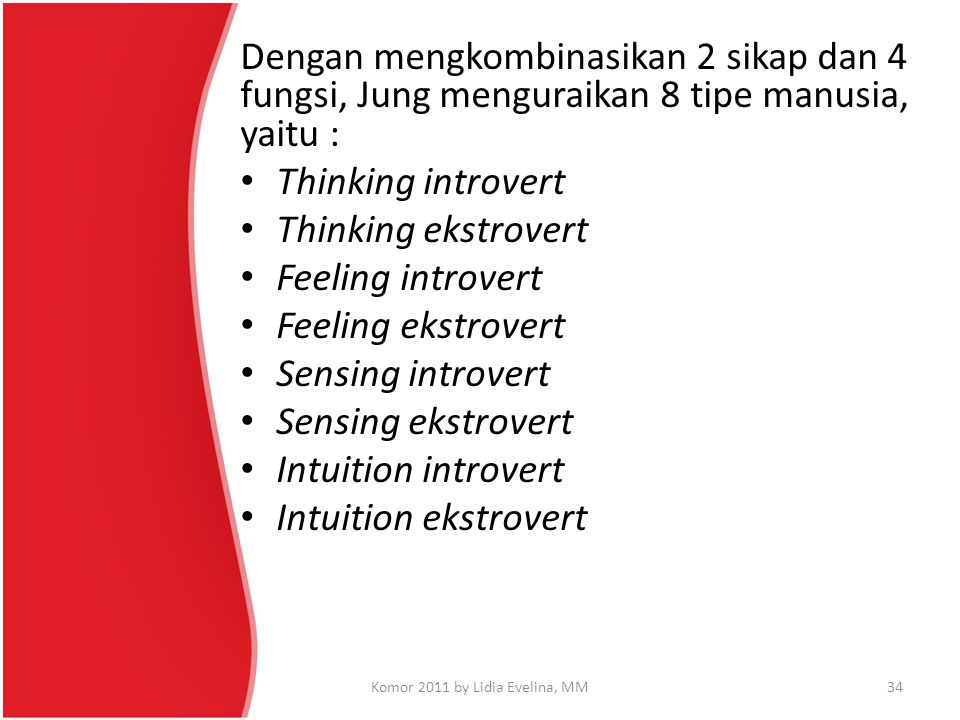
S (Sensing, feeling) - orientation based on specific details, facts and experiences. Such people are more practical than theoretical. They are absorbed by the real world around them, while they may not see the whole picture and the development of the situation in time. They prefer to observe life, they seek pleasure.
Orientation in the situation (perception)
Perception is not properly developed.
N (iNtuition, intuition) - orientation based on generalized information, premonition, intuition. Such people are more theorists than practitioners. They see the image as a whole, new opportunities and the development of the situation in time, while “leaving” reality. They prefer to predict events in life, looking for inspiration.
T (Thinking, thinking) - decisions are made by the "head", based on logic, carefully considering everything.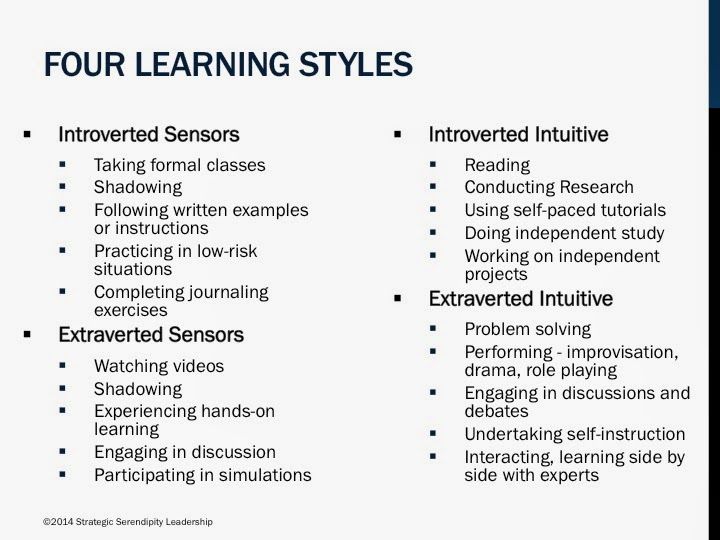 Such people are cold-blooded, but fair. They are fascinated by the objective laws of the world (science, technology).
Such people are cold-blooded, but fair. They are fascinated by the objective laws of the world (science, technology).
Decision-making basis (judgment)
F (Feeling, feeling) - decisions are made "with the heart", emotionally, focused on people's values, and not on abstract logic. Such people are sympathetic and empathetic. They are fascinated by humanitarian activities (literature, art).
J (Judging, judgment) - a rational function is directed to the outside world, that is, a judgment: thinking or feeling. Such people act on preliminary preparation, prefer to plan everything in advance, try to eliminate chaos. Unexpected changes unsettle them.
Mode of action in the outside world
Not a single function is directed to the outside world (but we can observe the attempts of the main function to interact with the outside world).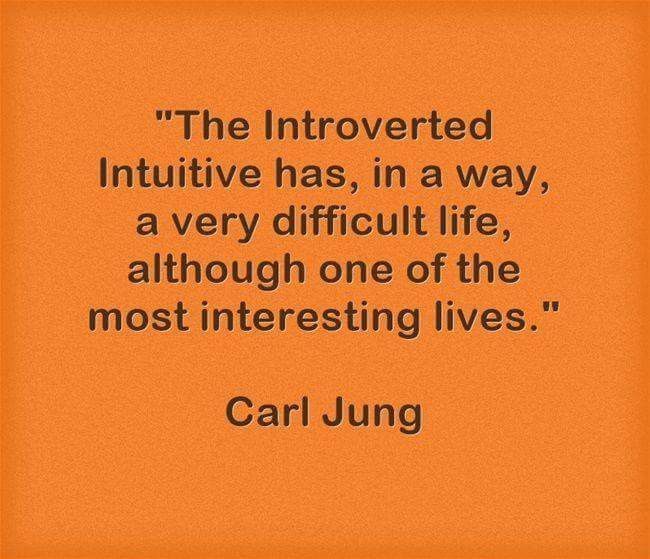
P (Perception, perception) - an irrational function is directed to the outside world, that is, perception: sensation or intuition. Such people strive to live flexible and spontaneous, act according to circumstances, easily adapt to unexpected changes. Action according to the plan constrains and limits them.
Introverted feeling type
Melancholic - "pure" introverted feeling type, in which the auxiliary function is not developed.
This is a rational type, since he makes a choice from what is happening on the basis of reasonable judgments. In contrast, the irrational type is guided by what exactly is happening at the moment. That is, for the rational type, reasonable judgments are more important than the perception of what is happening around. They consciously exclude everything random and disorderly from their lives.
Introverted feeling submits mainly to subjective preconditions, and attaches secondary importance to the object.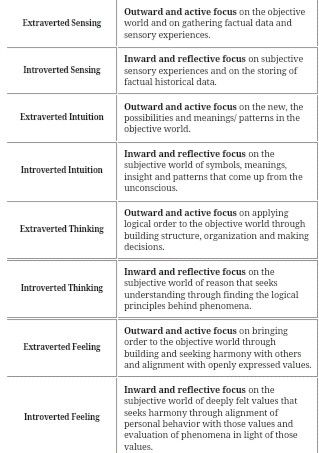 It is a feeling that seems to devalue objects and therefore, in most cases, declares itself in a negative sense.
It is a feeling that seems to devalue objects and therefore, in most cases, declares itself in a negative sense.
It is constantly looking for an image that does not actually occur, which it has, to a certain extent, seen before. It glides, as it were, without attention over objects that never correspond to its purpose.
In most cases, such people are silent, hard to reach, incomprehensible, often hidden under a childish or banal mask, and often also have a melancholic temperament.
Since this type in most cases seems cold and reserved, a superficial judgment easily denies any feeling in him. But it's in is fundamentally false, for feelings, though extensive, are intense. They develop in depth.
This type of dichotomy preference would be:
E (Extraversion, extraversion) - orientation to external objects. Such people are open, more active, easily communicate with strangers. They like to spend time in the outer world of people and things rather than in the inner world of ideas and images.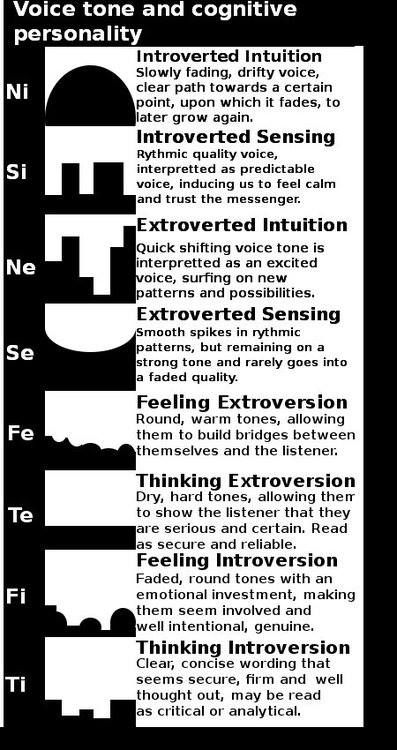
Orientation of consciousness
I (Introversion, introversion) — orientation to your inner world. Such people are closed, less active, communication with strangers is tiring and wastes energy. They like to spend time in the inner world of ideas and images rather than in the outer world of people and things.
S (Sensing, feeling) - orientation based on specific details, facts and experiences. Such people are more practical than theoretical. They are absorbed by the real world around them, while they may not see the whole picture and the development of the situation in time. They prefer to observe life, they seek pleasure.
Orientation in the situation (perception)
Perception is not properly developed.
N (iNtuition, intuition) - orientation based on generalized information, premonition, intuition.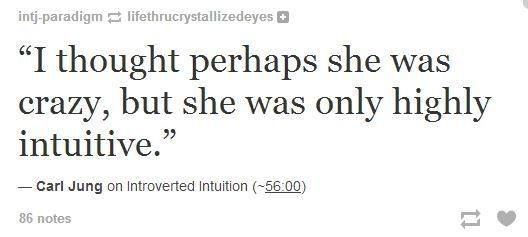 Such people are more theorists than practitioners. They see the image as a whole, new opportunities and the development of the situation in time, while “leaving” reality. They prefer to predict events in life, looking for inspiration.
Such people are more theorists than practitioners. They see the image as a whole, new opportunities and the development of the situation in time, while “leaving” reality. They prefer to predict events in life, looking for inspiration.
T (Thinking, thinking) - decisions are made by the "head", based on logic, carefully considering everything. Such people are cold-blooded, but fair. They are fascinated by the objective laws of the world (science, technology).
Decision-making basis (judgment)
F (Feeling, feeling) - decisions are made "with the heart", emotionally, focused on the values of people, and not on abstract logic. Such people are sympathetic and empathetic. They are fascinated by humanitarian activities (literature, art).
J (Judging, judgment) - a rational function is directed to the outside world, that is, a judgment: thinking or feeling. Such people act on preliminary preparation, prefer to plan everything in advance, try to eliminate chaos.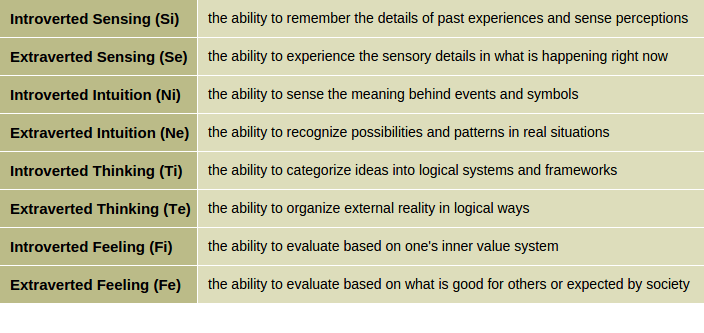 Unexpected changes unsettle them.
Unexpected changes unsettle them.
Mode of action in the outside world
Not a single function is directed to the outside world (but we can observe the attempts of the main function to interact with the outside world).
P (Perception, perception) - an irrational function is directed to the outside world, that is, perception: sensation or intuition. Such people strive to live flexible and spontaneous, act according to circumstances, easily adapt to unexpected changes. Action according to the plan constrains and limits them.
Introverted Sensing Type
The artist is a "pure" introverted sensing type, whose auxiliary function is not developed.
This is an irrational type, because he is guided by what exactly is happening at the moment. In contrast, the rational type makes a choice from what is happening on the basis of reasonable judgments.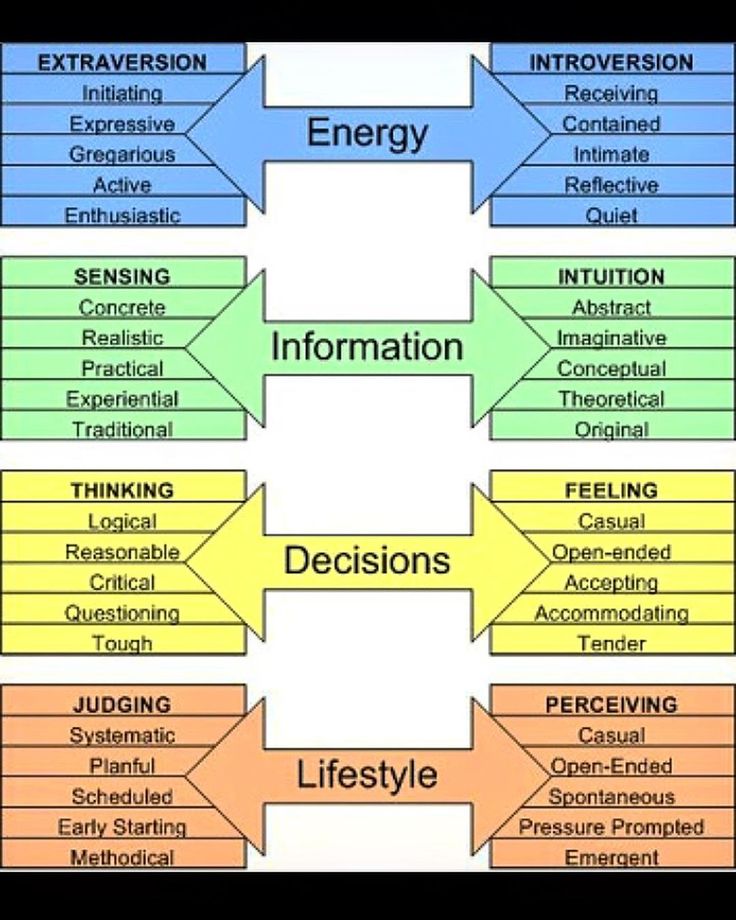 That is, for the irrational type, the perception of what is happening around is more important than reasonable judgments. But it would be completely wrong to interpret these types as "unreasonable" because of this, their reasoning simply cannot keep up with experience.
That is, for the irrational type, the perception of what is happening around is more important than reasonable judgments. But it would be completely wrong to interpret these types as "unreasonable" because of this, their reasoning simply cannot keep up with experience.
In the introverted attitude, the subject brings his own subjective disposition to the objective stimulus, as a result of which he sees things in a completely different way or sees completely different things than other people. At the same time, one can never foresee what will impress and what will not impress.
Sometimes an individual is not able to distinguish between a real object and subjective perception, an illusory perception of reality arises. He seems to live in his own world.
This type is only with extreme difficulty accessible to objective understanding, his actions for others seem extremely strange.
Their gaze is riveted to the richness of subjective events. They do not see that their outwardly manifesting achievements are practically useless.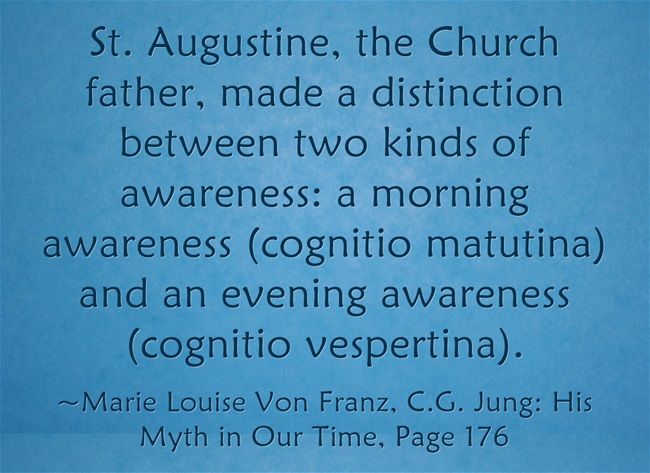 Such types may seem the most useless of all people, but in fact they are a kind of engines of culture and art.
Such types may seem the most useless of all people, but in fact they are a kind of engines of culture and art.
The most striking example of the introverted feeling type is the creative artist.
This type of preference in dichotomies would have the following:
E (Extraversion, extraversion) - orientation to external objects. Such people are open, more active, easily communicate with strangers. They like to spend time in the outer world of people and things rather than in the inner world of ideas and images.
Orientation of consciousness
I (Introversion, introversion) — orientation to your inner world. Such people are closed, less active, communication with strangers is tiring and wastes energy. They like to spend time in the inner world of ideas and images rather than in the outer world of people and things.
S (Sensing, feeling) - orientation based on specific details, facts and experiences.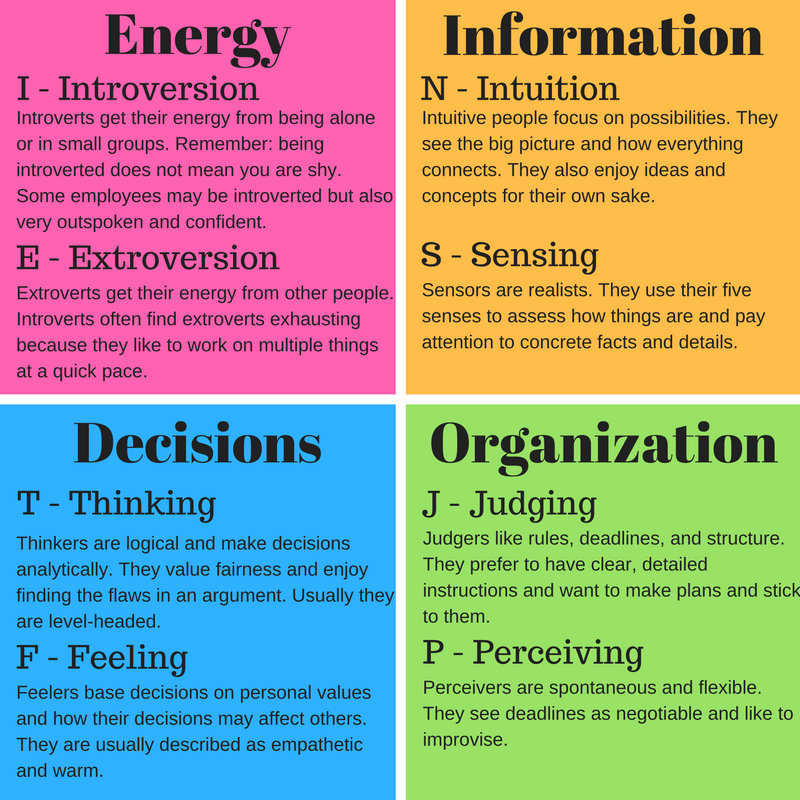 Such people are more practical than theoretical. They are absorbed by the real world around them, while they may not see the whole picture and the development of the situation in time. They prefer to observe life, they seek pleasure.
Such people are more practical than theoretical. They are absorbed by the real world around them, while they may not see the whole picture and the development of the situation in time. They prefer to observe life, they seek pleasure.
Orientation in the situation (perception)
N (intuition, intuition) - orientation based on generalized information, premonition, intuition. Such people are more theorists than practitioners. They see the image as a whole, new opportunities and the development of the situation in time, while “leaving” reality. They prefer to predict events in life, looking for inspiration.
T (Thinking, thinking) - decisions are made by the "head", based on logic, carefully considering everything. Such people are cold-blooded, but fair. They are fascinated by the objective laws of the world (science, technology).
Decision-making basis (judgment)
Judgment is not properly developed.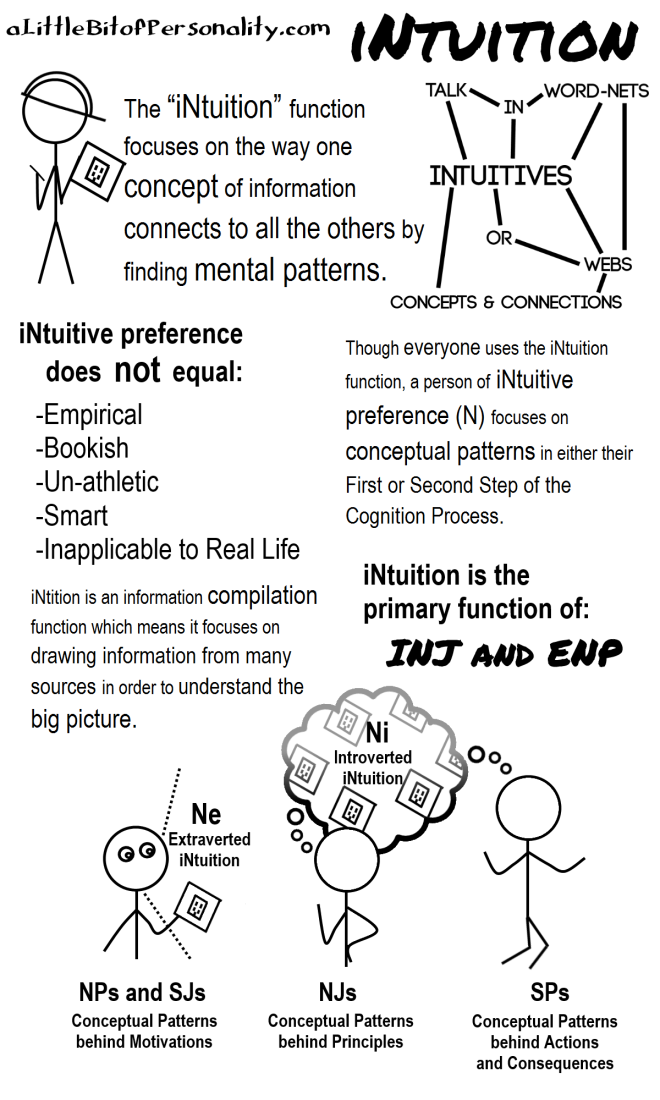
F (Feeling, feeling) - decisions are made "with the heart", emotionally, focused on people's values, and not on abstract logic. Such people are sympathetic and empathetic. They are fascinated by humanitarian activities (literature, art).
J (Judging, judgment) - a rational function is directed to the outside world, that is, a judgment: thinking or feeling. Such people act on preliminary preparation, prefer to plan everything in advance, try to eliminate chaos. Unexpected changes unsettle them.
Mode of action in the outside world
Not a single function is directed to the outside world (but we can observe the attempts of the main function to interact with the outside world).
P (Perception, perception) - an irrational function is directed to the outside world, that is, perception: sensation or intuition. Such people strive to live flexible and spontaneous, act according to circumstances, easily adapt to unexpected changes.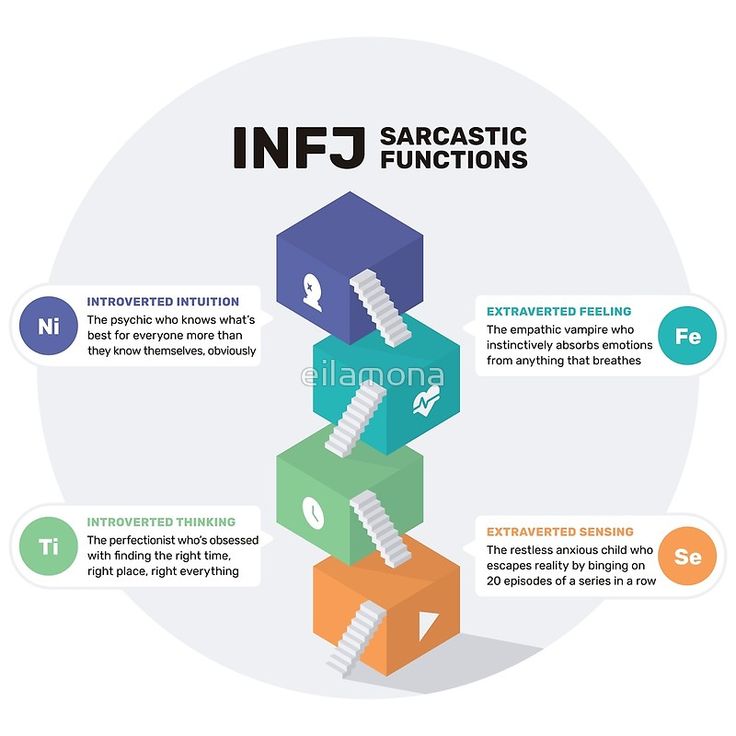 Action according to the plan constrains and limits them.
Action according to the plan constrains and limits them.
Introverted intuitive type
Prophet - "pure" introverted intuitive type, which has not developed an auxiliary function.
This is an irrational type, because he is guided by what exactly is happening at the moment. In contrast, the rational type makes a choice from what is happening on the basis of reasonable judgments. That is, for the irrational type, the perception of what is happening around is more important than reasonable judgments. But it would be completely wrong to interpret these types as "unreasonable" because of this, their reasoning simply cannot keep up with experience.
Intuition in an introverted attitude is directed to internal objects, that is, subjective images of things that do not occur in external experience, but constitute the content of the unconscious. Introverted intuition perceives everything that happens in the distant planes of consciousness with the same clarity with which another person can touch external objects.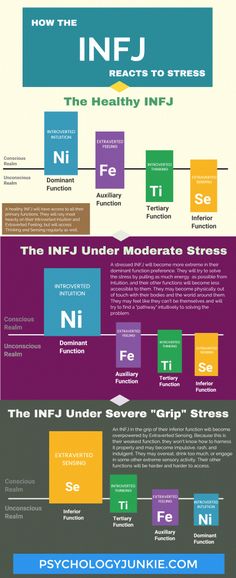
The introverted intuitive type lives in the world of images and moves from image to image, chasing after all the possibilities contained in the creative bosom of the unconscious. Reality does not exist for him, he indulges in fruitless daydreams, so that he becomes a complete enigma even to his immediate environment. His language is not the one everyone speaks; it's too subjective. His arguments lack persuasive rationality. He can only confess or proclaim. He is the voice of a preacher in the wilderness.
Their gaze is riveted to the richness of subjective events. They do not see that their outwardly manifesting achievements are practically useless. Such types may seem the most useless of all people, but in fact they are a kind of engines of culture and art.
Such features create a peculiar type of person, namely a mystic-dreamer and seer, on the one hand, a dreamer and an artist, on the other. Israel would not have had their own prophets if this type did not exist.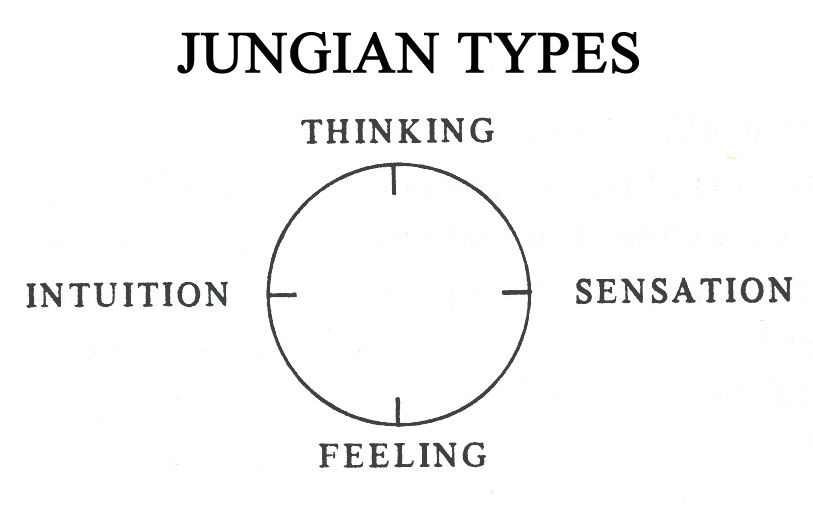
This type of preference in dichotomies would have the following:
E (Extraversion, extraversion) - orientation to external objects. Such people are open, more active, easily communicate with strangers. They like to spend time in the outer world of people and things rather than in the inner world of ideas and images.
Orientation of consciousness
I (Introversion, introversion) — orientation to your inner world. Such people are closed, less active, communication with strangers is tiring and wastes energy. They like to spend time in the inner world of ideas and images rather than in the outer world of people and things.
S (Sensing, feeling) - orientation based on specific details, facts and experiences. Such people are more practical than theoretical. They are absorbed by the real world around them, while they may not see the whole picture and the development of the situation in time.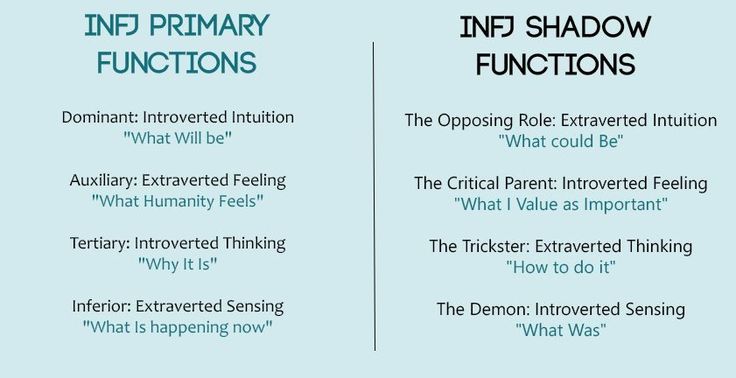 They prefer to observe life, they seek pleasure.
They prefer to observe life, they seek pleasure.
Orientation in a situation (perception)
N (intuition, intuition) - orientation based on generalized information, premonition, intuition. Such people are more theorists than practitioners. They see the image as a whole, new opportunities and the development of the situation in time, while “leaving” reality. They prefer to predict events in life, looking for inspiration.
T (Thinking, thinking) - decisions are made by the "head", based on logic, carefully considering everything. Such people are cold-blooded, but fair. They are fascinated by the objective laws of the world (science, technology).
Decision-making basis (judgment)
Judgment is not properly developed.
F (Feeling, feeling) - decisions are made "with the heart", emotionally, focused on people's values, and not on abstract logic.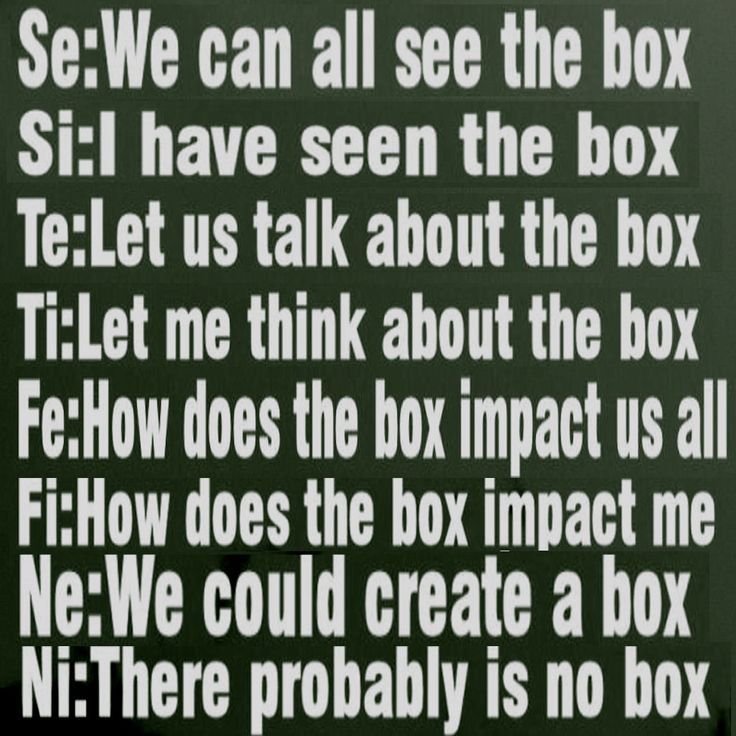 Such people are sympathetic and empathetic. They are fascinated by humanitarian activities (literature, art).
Such people are sympathetic and empathetic. They are fascinated by humanitarian activities (literature, art).
J (Judging, judgment) - a rational function is directed to the outside world, that is, a judgment: thinking or feeling. Such people act on preliminary preparation, prefer to plan everything in advance, try to eliminate chaos. Unexpected changes unsettle them.
Mode of action in the outside world
Not a single function is directed to the outside world (but we can observe the attempts of the main function to interact with the outside world).
P (Perception, perception) - an irrational function is directed to the outside world, that is, perception: sensation or intuition. Such people strive to live flexible and spontaneous, act according to circumstances, easily adapt to unexpected changes. Action according to the plan constrains and limits them.